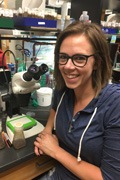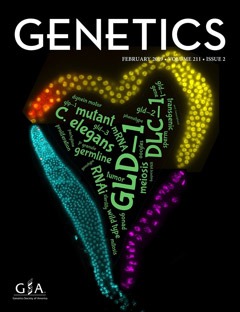
The Multilingual Seminar Series is a panel/workshop discussion series aimed at multilingual and non-English speaking scientists. The goal of the series is to connect scientists and provide a platform for talking about science in a language other than English. Since the events will be held in their respective languages, they are accessible to those who do not speak English.
Upcoming seminar
Yoruba Multilingual Seminar
February 15, 2025, at 11:00 a.m. EST
Join us for a Yoruba seminar where panelists discuss genomic applications for adequate health care.
Interested in hosting a workshop?
- If you would like to hold a panel discussion/workshop in your language of choice, we will rely on you to contact and communicate with fellow scientists who may not speak English.
- The workshop/panel discussion will be held entirely in your native language, so we will rely on you to be the moderator.
- All workshops will be required to follow the GSA Code of Conduct.
If you would like to organize one of these workshops in your language of choice, please enter your information here.
View Previous Seminars
Blog posts about Multilingual Seminars

The Spanish Multilingual Seminar: Challenges of communicating science as Spanish speakers
Carla Bautista Rodriguez is a PhD candidate in evolutionary biology at Laval University (Canada) and a member of the Genetics Society of America. She is also passionate about outreach and scientific communication. She is an...
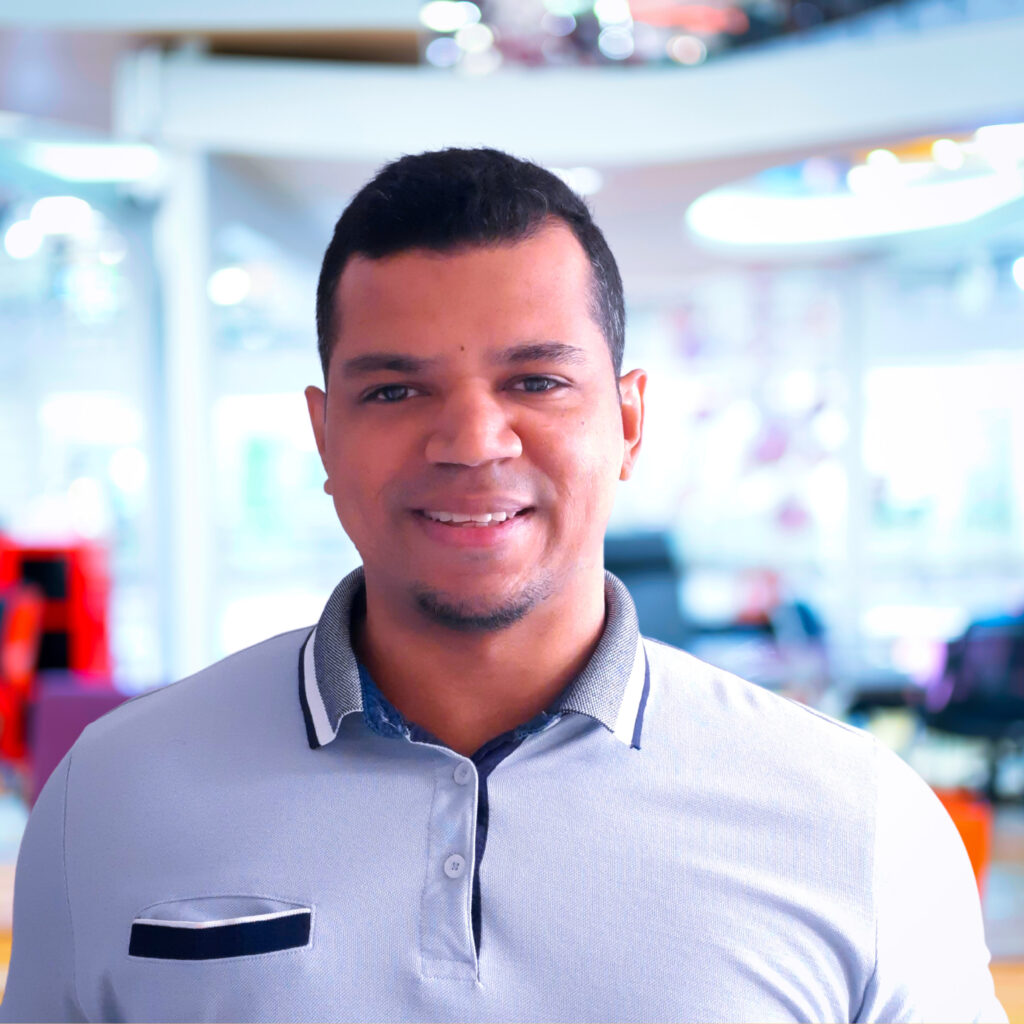
Early Career Leadership Spotlight: Jadson C. Santos (Jall)
Jadson C. Santos (Jall) Career Development Subcommittee University of São Paulo Research Interest I have carried out research in various scientific areas—among them, human genetics, bioinformatics, structural biology of proteins, and molecular immunology. I’ve always...

Doing science as a non-native English speaker: Important takeaways from the first Portuguese Multilingual Seminar
Guest post by J. Humberto Cunha, Danielle F. Mello, and Jadson Carlos dos Santos. The Genetics Society of America, Portuguese Multilingual Seminar took place on November 16, 2021, and was attended by four guest panelists...
Previous Seminars:
Turkish
August 22, 2022, 10 a.m.–11 a.m. EST
Are you a Turkish-speaking scientist?
- Do you love science and have an interest in a career in genetics?
- Do you struggle to communicate your science in Turkish or in English?
- Are you considering getting involved in science communication in Turkish?
Join us for the Turkish-speaking session of the GSA Multilingual Seminar Series!
Our panel of experts—Dr. Arta Fejzullahu, Dr. Duygu Özpolat, and Dr. Ozan Kıratlı—will share their experiences and discuss how to choose career paths and engage in scientific conversations. The session will be held in Turkish.
Türkçe konuşan bir bilimci misiniz?
- Bilimi seviyorsanız ve genetik alanında bir kariyer planlıyorsanız,
- Türkçe veya İngilizce bilim iletişiminde problem yaşıyorsanız,
- Türkçe bilim iletişimine ilginiz varsa ve bu konuya katkıda bulunmak istiyorsanız,
Genetics Society of America (GSA) tarafından düzenlenen “Multilingual Seminar” Serisinin Türkçe oturumunda bize katılın!
Alanda uzman panelistlerimiz – Dr. Arta Fejzullahu, Dr. Duygu Özpolat and Dr. Ozan Kıratlı – deneyimlerini bizlerle paylaşacaklar ve sorularınızı yanıtlayacaklar. Kariyer seçimi ve bilim iletişimi gibi konuları ele alacağımız ve tartışmayı tamamen Türkçe gerçekleştireceğimiz bu panele davetlisiniz!
Moderator
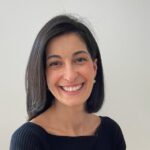
Aysegul Aydin
Dr. Aydin received her BS degree in Biochemistry from Ege University in 2009, her MSc degree in Anatomy & Biophysics in 2012, and her PhD degree in Neuroscience in 2018 from Pamukkale University, Turkey. She was awarded an International Research Fellowship by The Scientific and Technological Research Council of Turkey. She completed her dissertation project in Alev Erisir’s lab at the University of Virginia investigating the role of catecholaminergic pathways in ADHD. She joined Dr. Dan Meliza’s lab in February 2020 to work on the involvement of the voltage-gated potassium channel (Kv1.1) in auditory learning. She joined the CLEF lab in the Summer of 2021 to investigate epigenetic neural mechanisms in the adult auditory brain.
Dr. Aydin lisans eğitimini Ege Üniversitesi Biyokimya Bölümü’nden 2009 yılında tamamladıktan sonra 2012 yılında Anatomi ve Biyofizik alanında yüksek lisansını ve 2018 yılında Pamukkale Üniversitesi’nden Nörobilim dalında doktorasını almıştır. Türkiye Bilimsel ve Teknolojik Araştırma Kurumu (TUBİTAK) tarafından verilen Yurtdışı Araştırma Bursu’na hak kazanmıştır. Tez projesini Virginia Üniversitesi’nde Alev Erişir’in labında dikkat eksikliği hiperaktivite bozukluğunda katekolaminerjik yolakların rolü üzerinde tamamlamıştır. Şubat 2020’de Dr. Dan Meliza’nın labına katılarak voltaj-kapılı potasyum kanallarının (Kv1.1) işitsel öğrenmedeki rolü üzerine çalışmıştır. Yetişkin işitsel beyindeki epigenetik nöral mekanizmaları araştırmak amaçlı 2021 yazında CLEF labına katılmıştır.
Panelists
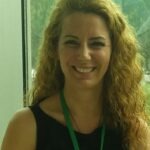
Arta Fejzullahu
Arta Fejzullahu graduated from Istanbul Technical University, Department of Molecular Biology and Genetics in 2008 and earned her master’s degree in Molecular Biology & Genetics and Biotechnology Program from the same university. She completed her doctoral studies at Marmara University Faculty of Medicine, Department of Medical Biology and Genetics in 2021.
She worked at Istanbul Aydin University as a lecturer between 2014–2021 and has been working as an Assistant Professor at the Faculty of Medicine, Department of Medical Biology and Genetics, since 2021. She is also working as Director of the Health Service Policies Application and Research Center.
Her research areas are Metastatic Cancer Mechanism, Signaling Pathways, Personalized Therapy, and Bioinformatics.
Arta Fejzullahu, İstanbul Teknik Üniversitesi Moleküler Biyoloji ve Genetik Bölümü’nden lisans eğitimini 2008 yılında tamamladıktan sonra yine aynı Üniversiteden Fen Bilimleri Enstitüsü, Moleküler Biyoloji & Genetik ve Biyoteknoloji Programı’ndan yüksek lisans derecesini kazanmıştır. Doktora çalışmalarını Marmara Üniversitesi Tıbbi Biyoloji ve Genetik Anabilim Dalında 2021 yılında tamamlamıştır.
İstanbul Aydın Üniversitesinde 2014-2021 yılları arasında Öğretim Görevlisi, 2021 yılından itibaren İAÜ Tıp Fakültesi (İng.) Tıbbi Biyoloji ve Genetik Anabilim Dalı Dr. Öğretim Üyesi ve Sağlık Hizmet Politikaları Uygulama ve Araştırma Merkezi Müdürü görevlerine devam etmektedir.
İlgi alanları: Metastatik Kanser Mekanizması, Sinyal Yolakları, Kişiye Özgü Tedavi ve Biyoinformatik.
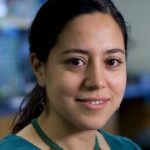
B. Duygu Özpolat
Duygu (Do-ee-goo) Özpolat is an Assistant Professor in the Biology Department at Washington University in St. Louis. She received her BSc in Biology at Middle East Technical University in Ankara, Turkey, and her PhD at Tulane University in New Orleans, where she worked on elbow joint regeneration in chicken embryos. During her studies at Tulane, she has developed an interest in understanding how some organisms can regrow lost body parts such as arms, tails, reproductive organs, or even their head complete with a fully functional brain, while others appear to completely lack this remarkable ability. After getting her PhD degree in pursuit of answers to mechanisms of regeneration, she worked on freshwater and marine worms at the University of Maryland in College Park, and then at the Institut Jacques Monod in Paris, France. Using these small and transparent worms, she developed live-imaging techniques to understand cell behavior in live animals during regeneration and development. At WashU, Duygu continues to use these worms for determining the types of cells that participate in the process of replacing lost body parts and tissues, especially while regenerating reproductive organs and cells. In addition to being a scientist, Duygu is also a visual artist and makes science-themed art (SciArt) inspired by scientific research using a variety of media such as pottery, drawing, and embroidery. http://ozpolatlab.org
Duygu Özpolat Washington University in St. Louis bünyesindeki Biyoloji Bölümü’nde Asistan Profesör olarak çalışmakta. Dr. Özpolat, Orta Doğu Teknik Üniversitesi’nin Biyoloji Bölümü’nden mezun olduktan sonra, doktorasını New Orleans’ta Tulane University’de tamamladı. Tulane’deki doktora çalışmaları esnasında Dr. Özpolat rejenerasyon konusuna odaklandı. Kesilen veya ciddi zarar gören kol, kuyruk, üreme organı gibi vücut parçalarının veya organlarının yenileyebilme yeteneği üzerine çalıştı. Dr. Özpolat doktorasını tamamladıktan sonra, rejenerasyon mekanizmalarını anlayabilmek için College Park’taki University of Maryland’de ve ardından Paris’teki Institut Jacques Monod bünyesinde tatlı su ve denizel halkalı solucanları kullanarak rejenerasyon araştırmalarını sürdürdü. Bu küçük ve transparan solucanları kullanarak geliştirdiği canlı-görüntüleme mikroskop tekniklerinden faydalanarak, canlı hayvanlardaki hücresel rejenerasyon ve gelişim mekanizmalarını araştırdı. Dr. Özpolat, şu anda Washington University in St. Louis bünyesinde yine bu solucanları kullanarak, kaybolan vücut parçalarının ve dokuların, özellikle de üreme organları ve hücrelerinin yenilenmesinde görev alan hücre çeşitlerini ve genetik mekanizmaları araştırmaya devam ediyor. Bilimci olmanın yanı sıra Dr. Özpolat, aynı zamanda bilimsel araştırmalardan ilham alarak seramik, çizim ve nakış gibi çeşitli tekniklerle bilim temalı sanat (SciArt) üreten bir görsel sanatçı. http://ozpolatlab.org
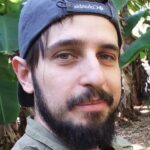
Ozan Kıratlı
Dr. Ozan Kıratlı is an evolutionary ecologist who is working on the effects of migration on rapid adaptation in natural populations. He recently obtained his PhD in Biology from the University of Pennsylvania and holds MS and BS in Biology with a minor in Physics from Middle East Technical University. Ozan is interested in making connections between real-world issues and the theoretical foundation of evolutionary biology using experimental methods and analyzing data from natural populations. As a science communicator, he focuses on the disconnect between the public and the science community and tries to identify the issues within and beyond academia, and aims to create an honest and genuine environment where communication is at the core.
Ozan Kıratlı göçün doğal popülasyonların hızlı adaptasyonu üzerindeki etkilerini çalışmakta olan bir evrimsel çevre bilimcidir. Biyoloji doktorasını yakın zamanda Pennsylvania Üniversitesi’nden almış olup, Biyoloji yüksek lisans ve lisans dereceleri ve Fizik yan dal derecesini Orta Doğu Teknik Üniversitesi’nde tamamlamıştır. Ozan’ın ilgi alanı deneysel yöntemler ve doğal popülasyon verilerini kullanarak gerçek dünya soruları ile evrimsel biyoloji arasındaki bağlantıları kurmak olarak özetlenebilir. Bir bilim iletişimcisi olarak Ozan, toplum bilim arasındaki kopukluklara odaklanmakta olup, akademi içi ve dışındaki sorunların altını çizmeye çalışmaktadır. Bu sayede dürüstlük ve samimiyete dayalı ve iletişim merkezli bir ortam oluşturmayı hedeflemektedir.
Organizers
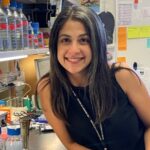
Gonen Memisoglu
Gonen Memisoglu received her BSc degree in Molecular Biology and Genetics from Bogazici University in Istanbul, Turkey. After working as a research technician at Beth Israel Deaconess Medical Center at Harvard Medical School, she started her PhD at Brandeis University. During her PhD in Dr. James E. Haber’s lab, Gonen investigated cellular pathways involved in DNA repair and DNA damage response. She continued her post-doctoral work at Northwestern University in Dr. Dimitri Krainc’s lab, studying mitochondrial DNA damage. Currently, she is a post-doctoral fellow at the University of Chicago, under the mentorship of Dr. Alexander J. Ruthenburg, focusing on the crosstalk between transcriptional regulation and DNA damage response.
Gönen Memişoğlu, lisans eğitimini Boğaziçi Üniversitesi’nin Moleküler Biyoloji ve Genetik Bölümü’nde tamamladı. Harvard Medical School bünyesindeki Beth Israel Deaconess Medical Center’da araştırma teknikeri olarak çalıştıktan sonra Brandeis University’de doktora eğitimine başladı. Brandeis University’de Dr. James E. Haber’in laboratuvarında doktora öğrencisi olarak DNA hasarlarının onarımı ve DNA hasarlarının etkinleştirdiği hücresel yolakları araştırmaya yoğunlaştı. Doktora sonrasında araştırmalarını Northwestern University’de Dr. Dimitri Krainc’in laboratuvarında mitokondri DNA’sı hasarlarını çalışarak devam ettirdi. Gönen doktora sonrası araştırmacı olarak the University of Chicago’da Dr. Alexander J. Ruthenburg’un laboratuvarında DNA hasarının etkileştiği yolakları ve bu yolakların RNA metabolizması tarafından nasıl etkilendiğini anlamaya çalışıyor.
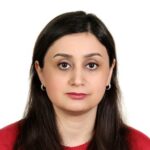
Parinaz Khalilzadeh
Parinaz is a graduate student in biology at Laurentian University, Canada. She is interested in research questions related to wildlife conservation genetics, population genetics, and evolution. Her current project is on the northern leopard frog’s conservation genetics in western Canada. She also has a master’s in biodiversity and habitats at Gorgan University, Iran, where her investigation was on Iranian wild boars’ genetic diversity.
Parinaz Laurentian Üniversitesi’nde (Kanada) biyoloji alanında yüksek lisans öğrencisidir. Yaban hayatı koruma genetiği, popülasyon genetiği ve evrim ile ilgili araştırma sorularıyla ilgilenmektedir. Şu anki projesi, batı Kanada’daki kuzey leopar kurbağasının genetiği üzerinedir. Ayrıca, Parinaz İran Gorgan Üniversitesi’nde bioçeşitlilik ve habitatlar konusunda yüksek lisans yapmıştır ve İran yaban domuzlarının genetik çeşitliliği üzerinde araştırma yapmıştır.
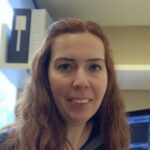
Seyma Katrinli
Dr. Seyma Katrinli works on psychiatric genetics as a postdoctoral research fellow at Emory University School of Medicine. She completed her PhD in Molecular Biology & Genetics and Biotechnology at Istanbul Technical University, Istanbul, Turkey. During her PhD she studied proteomic alterations associated with liver fibrosis in Hepatitis B, and the effect of Human Leukocyte Antigen (HLA) alleles on the outcomes of Hepatitis B (HBV) infection (i.e., disease activity and drug response). Her current research uses multiple types of genome-wide data (genetic, epigenetic, and gene expression) to develop a more comprehensive understanding of stress-related psychiatric disorders and to explain the relationship between the immune system and stress-related psychiatric disorders. Dr. Seyma Katrinli was a member of GSA’s Early Career Scientist Leadership Program between 2019–2022.
Dr. Şeyma Katrinli Emory Üniversitesi Tıp Fakültesi’nde doktora sonrası araştırmacı olarak psikiyatrik genetik alanında çalışmaktadır. Dr. Katrinli, İstanbul Teknik Üniversitesi’nde Moleküler Biyoloji & Genetik ve Biyoteknoloji alanında doktorasını tamamlamıştır. Doktorasında Hepatit B hastalığında görülen karaciğer fibrozu ile ilişkili proteomik değişiklikler ve HLA allellerinin Hepatit B enfeksiyonundaki etkileri (hastalık aktivitesi ve tedavi yanıtı) üzerinde çalışmıştır. Şu andaki çalışmalarında çeşitli genom-boyu veri setleri (genetik, epigenetik, ve gen ekspresyonu) kullanarak stres ilişkili psikiyatrik hastalıkları araştırmaktadır ve özellikle stres ilişkili psikiyatrik hastalıkların immün sistem ile ilişkisi üzerinde çalışmaktadır. Dr. Şeyma Katrinli 2019 – 2022 yılları arasında GSA Kariyer Başlangıcındaki Bilim Adamı Liderlik Programı’nın üyesi olarak görev yapmıştır.
Polish
March 8, 2022 at 18:00 CET / 12:00 p.m. EST
Are you a Polish-speaking scientist?
- Do you love science and have an interest in a career in genetics?
- Do you struggle to communicate your science in Polish or in English?
- Are you considering getting involved in science communication in Poland?
Our panel of experts—Joanna Bagniewska, Rafal Mostowy, and Natalia Osica—will share their experiences and discuss how to choose career paths and engage in scientific conversations. Join us for the first session of the GSA Multilingual Seminar Series in 2022! The session will be held in Polish.
This event is co-organized with the Polonium Foundation.
Czy jesteś naukowcem posługującym się językiem polskim?
- Czy kochasz naukę i jesteś zainteresowany karierą związaną z genetyką?
- Czy komunikowanie nauki w języku polskim lub angielskim sprawia Ci problem?
- Czy zastanawiasz się nad zaangażowaniem się w komunikowanie nauki w Polsce?
Nasz panel ekspertów – Joanna Bagniewska, Rafał Mostowy, Natalia Osica – podczas dyskusji podzieli się swoim doświadczeniem jak wybrać ścieżki kariery i zaangażować się w naukowe dyskusje. Dołącz do nas na pierwszą sesję GSA Wielojęzycznej Serii Seminariów w 2022 roku! Wydarzenie odbędzie się w języku polskim.
Moderator
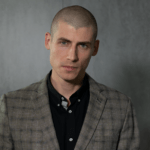
Adam Zalewski
Z wykształcenia dziennikarz, pedagog resocjalizacyjny i politolog. Redaktor naczelny portalu Biotechnologia.pl– pierwszego i największego w Polsce serwisu popularnonaukowego w dziedzinie innowacyjnego biobiznesu, istniejącego niezmiennie od 1996 r.Popularyzator nauki, który w ramach kanału YouTube Bio-Tech Media prowadzi wywiady z przedstawicielami środowiska LifeScience. Moderator paneli dyskusyjnych i prelegent podczas licznych wydarzeń branżowych zarówno w Polsce, m.in. Forum Wizja Rozwoju, Beauty Innovations, targów Spotkaj Swojego Pracodawcę, webinarów w ramach projektu EIT Food, jak i na świecie – West China (Chengdu) International Supply Chain and Smart Logistics Expo 2020, International Communicable Diseases Conference w Wilnie czy Viral Infections of Regional Significance w Moskwie. Współorganizator konferencji dla uczestników rynku kapitałowego Biznes w Genach, w której co roku bierze udział ok. 10-15 tys. słuchaczy. Jedna z osób odpowiadająca za kontent merytoryczny dla dwóch edycji największej imprezy gospodarczej w regionie Europy Środkowej – Impact ’18 i ’19. Jako jedyny Polak został wybrany do udziału w szkoleniu dla europejskich liderów opinii dotyczącym metody edycji genów CRISPR-Cas9, organizowanym przez Sekcję Rolną Ambasady Stanów Zjednoczonych na Uniwersytecie w Wageningen w Holandii. Autor artykułów naukowych na temat lekomanii oraz badań marketingowych rynku leków, suplementów diety i wyrobów medycznych. Prywatnie pasjonat sportu (triathlonu, boksu, wspinaczki, biegów przeszkodowych), zdrowego stylu życia oraz praktyk mindfulness.
Journalist, correctional pedagogist, and political scientist by education. Editor-in-Chief of Biotechnologia.pl, the first and the most prominent popular science website in Poland in the area of innovative bio business, since 1996. Popularizer of science who conducts interviews with representatives of the LifeScience community on YouTube’s Bio-Tech Media channel. Moderator of discussion panels and panelists during multiple industry events in Poland, including Forum Wizja Rozwoju (Development Vision Forum), Beauty Innovations, Meet Your Employer trade show, EIT Food webinars, and around the world – West China (Chengdu) International Supply Chain and Smart Logistics Expo 2020, International Communicable Diseases Conference in Vilnius or Viral Infections of Regional Significance in Moscow. Co-organizer of the conference for the participants of the Biznes in Genes capital market, which gathers around 10-15 thousand listeners every year. One of the people responsible for substantive content for two editions of the biggest economic meeting in the Central Europe region, Impact ’18 and ’19. The only Polish person chosen to participate in the training for the European leaders of opinions regarding gene-editing method CRISPR-Cas9, organized by the Office of Agricultural Affairs of the United States Embassy at the Wageningen University in the Netherlands. Author of multiple publications about prescription drug addiction and marketing research of prescription drugs, medicines, dietary supplements, and medical supplies. Privately passionate about sport (triathlon, boxing, climbing, Obstacle Course Racing), a healthy lifestyle, and mindfulness practices.
Panelists
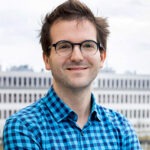
Rafal Mostowy, PhD (Jagiellonian University)
Rafał studiował początkowo fizykę teoretyczną na Uniwersytecie Jagiellońskim (2002-2005) i Uniwersytecie w Kopenhadze (2005-2007). W 2007 roku dołączył do grupy Sebastiana Bonhoeffera w ETH w Zurychu, aby kontynuować studia doktoranckie w dziedzinie biologii. Następnie otrzymał stypendium Szwajcarskiej Narodowej Fundacji Nauki “Prospective Postdoc”, aby dołączyć do grupy Christophe’a Frasera w Imperial College London. W 2013 r. otrzymał stypendium Marie Skłodowskiej-Curie Intra-European Fellowship, aby pracować nad ewolucją rekombinacji Streptococcus pneumoniae w Imperial College London, a następnie Imperial College Research Fellowship w School of Public Health. W 2018 roku Rafał dołączył do Big Data Institute na Uniwersytecie Oksfordzkim jako starszy badacz ewolucji bakteryjnej, a na początku 2019 roku przeniósł się do Krakowa, aby założyć grupę Genomiki Mikrobiologicznej. Rafał jest również współzałożycielem Fundacji Polonium, organizacji łączącej polskich naukowców z całego świata, a także współautorem badań nad Polonią.
Rafał initially trained in theoretical physics at the Jagiellonian University (2002-2005) and the University of Copenhagen (2005-2007). In 2007 he joined the group of Sebastian Bonhoeffer at ETH Zurich to pursue a PhD in biology. After this, he received a Swiss National Science Foundation “Prospective Postdoc” fellowship to join the group of Christophe Fraser at Imperial College London. In 2013, he was awarded a Marie Skłodowska-Curie Intra-European Fellowship to work on the evolution of recombination in Streptococcus pneumoniae at Imperial College London, followed by an Imperial College Research Fellowship at the School of Public Health. In 2018, Rafał joined the Big Data Institute at the University of Oxford as a Senior Researcher in Bacterial Evolution, and early in 2019 he moved to Kraków to start the Microbial Genomics group. Rafał is also a co-founder of Polonium Foundation, an organization linking Polish researchers worldwide, and a co-author of a research study on the Polish Scientific Diaspora.
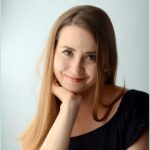
Joanna Bagniewska, PhD (Brunel University London, Oxford University)
Dr. Joanna Bagniewska jest zoologiem specjalizującym się w ekologii behawioralnej. Ukończyła doktorat i studia magisterskie na Uniwersytecie Oksfordzkim, przedtem studiowała na Jacobs University w Bremie i Rice University w Houston. Pracowała naukowo w pięciu krajach, odwiedziła ponad 40. Zwyciężczyni trzeciej edycji FameLab Poland, oraz zdobywczyni nagrody laureatów na finałach międzynarodowych tego konkursu. Obecnie wykłada na Wydziale Nauk o Środowisku Brunel University London, a także pracuje jako popularyzatorka nauki na Wydziale Pediatrii Uniwersytetu Oksfordzkiego.
Dr. Joanna Bagniewska is a zoologist specializing in behavioral ecology. She obtained her MSc and doctorate from Oxford University’s Zoology Department; previously, she studied at Jacobs University Bremen and Rice University in Houston. She conducted research in five countries and visited over 40. She’s the winner of FameLab Poland and the recipient of its International Alumni Award at the international finals. Joanna currently splits her time between two roles: Senior Lecturer in Environmental Sciences at Brunel University London, and Communications and Public Engagement Officer at Oxford University’s Department of Paediatrics.

Natalia Osica (Founder of PRO Science Foundation and Science PR)
Natalia Osica jest socjolożką wyspecjalizowana w zakresie komunikacji społecznej, rozwiązywania konfliktów, mediacji i negocjacji (absolwentka Instytutu Stosowanych Nauk Społecznych UW). Od ponad dekady działa na rzecz transferu wiedzy ze świata akademickiego do otoczenia społeczno-gospodarczego oraz społecznej odpowiedzialności nauki. Przygodę z sektorem akademickim rozpoczęła jeszcze na studiach jako stażystka w Fundacji Rektorów Polskich. W latach 2009-2012 jako rzecznik prasowy i PR menadżer zbudowała Centrum Prasowe SWPS, za które dla tej uczelni zdobyła dwie nagrody – od branży public relations za najlepszy projekt z zakresu PR korporacyjnego (Złoty Spinacz) oraz od środowiska akademickiego za najlepszy projekt promujący naukę (nagroda Stowarzyszenia PR i Promocji Uczelni Polskich „PRom”). W 2011 roku jako pierwszy rzecznik polskiej instytucji naukowej otrzymała tytuł Popularyzatora Nauki od redakcji Nauka w Polsce PAP. W latach 2012-2014 pełniła funkcję sekretarza, a potem prezes Polskiego Stowarzyszenia Dziennikarzy Naukowych “Naukowi.pl”. Jest jurorką w konkursie dla doktorantów Three Minutes Thesis organizowanym przez Centrum Popularyzacji Nauki Politechniki Śląskiej. Prowadzi zajęcia dla studentów dziennikarstwa Uniwersytetu SWPS oraz studentów Szkoły Doktorskiej UW. W 2013 roku ukazała się bezpłatna książka, którą napisała wspólnie z Wiktorem Niedzickim pt. „Sztuka promocji nauki” (wyd. OPI-PIB).
Natalia Osica jest fundatorką i założycielką Fundacji Science PRO oraz założycielką pro science (d. Science PR), pierwszej w Polsce firmy doradczej, która wspiera naukowców, instytuty naukowe i badawcze oraz uczelnie w budowaniu widoczności, wizerunku i relacji z otoczeniem.
Natalia Osica is a sociologist specializing in communication, conflict resolution, mediation, and negotiation (alumna of the Institute of the Applied Social Sciences at the University of Warsaw). For over a decade, Natalia worked on knowledge transfer from academia to society and societal science responsibilities. She started her adventure with the academic sector during college as an Intern in the Foundation of Polish Rectors. In the years 2009-2012 as press officer and PR manager, she built the Press Center of the University of Social Sciences and Humanities, which was awarded two awards – from the public relations sector for the best corporation PR project (Złoty Spinacz) and from the academic sector for the best project promoting science (an award from PR and Promoting Polish Science Society “PRom”). In 2011, as the first spokesperson of the Polish Science Institution, she received the title of Popularizer of Science from Science in Poland PAP Editorial Office. In 2012-2014 she was the Secretary of Polish Science Writers Association “Naukowi.pl”. She is a judge in the Three Minutes Thesis contest, organized by the Center of Popularizing Science of the Silesian University of Technology. She leads courses for the journalist students of the University of Social Sciences and Humanities and the Doctoral School students of the University of Warsaw. In 2013 she published the free book “The Art of Promoting Science,” which she wrote with Wiktor Niedzicki.
Natalia Osica is a founder of PRO Science Foundation and pro science (formerly Science PR), the first company in Poland that supports scientists, science institutions, and universities in building visibility, image, and relations with the public.
Organizers
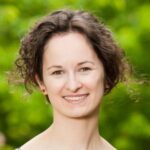
Anna Drangowska-Way, PhD
Dr. Anna Drangowska-Way jest członkiem GSA Early Career Scientist Leadership Program od 2020. W ramach programu, jest ona członkiem Communication and Outreach Subcommittee. Anna urodziła się w Polsce, gdzie studiowała na Uniwersytecie Wrocławskim. Po uzyskaniu tytułu licencjata i magistra Biotechnologii, uczęszczała na Uniwersytet w Wirginii, gdzie uzyskała tytuł doktora. Obecnie, Anna pracuje w Biurze Spotkań Naukowych i Konferencji FASEB (Federation of American Societies of Experimental Biology), gdzie organizuje międzynarodowe konferencje i spotkania naukowe.
Anna Drangowska-Way, PhD has been a member of GSA’s Early Career Scientist Leadership Program since 2020. As a part of the program, she works with the Communication and Outreach Subcommittee. Anna was born in Poland, where she attended the University of Wrocław. After obtaining Bachelor’s and Master’s in Biotechnology, she attended the University of Virginia where she obtained a PhD degree. Currently, Anna works for FASEB’s (Federation of American Societies of Experimental Biology) Office of Scientific Meetings and Conferences, where she organizes international conferences and scientific meetings.
Asia Kwiatek | Alicja Krawczun-Rygmaczewska – Polonium Foundation
Communication Officer
Vanessa Bijak – Polonium Foundation
Polonium Network Manager, SPP Meetup USA Manger
Portuguese
November 16, 2021, 4:00–5:00 p.m. Eastern Standard Time/6:00p.m. Brasilia Time
Moderators and Organizers
Jadson C. Santos
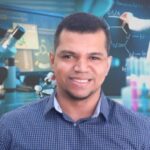 Jadson C. Santos é Biólogo e Mestre em Bioinformática e atualmente desenvolve pesquisas como estudante de doutorado na Universidade de São Paulo, USP. Seu trabalho científico está direcionado ao estudo do impacto de mutações na estrutura de proteínas e suas interações, integrando métodos in silico e experimentais. Em sua graduação, trabalhou no Laboratório de Genética Forense da Universidade de Alagoas com Genética Humana e Molecular, analisando marcadores genéticos de ancestralidade em populações brasileiras. Paralelamente aos trabalhos científicos, Jadson é estudante de MBA em Gestão de Projetos também pela Universidade de São Paulo, possui um Micro Master em Liderança de Negócios pela Universidade do Estado do Arizona, um segundo Micro Master em Liderança Digital pela Universidade de Boston em curso e treinamento em Liderança de Pessoas, Construção e Desenvolvimento de Equipes pelas Universidades do Michigan e da Pensilvânia. Atualmente, Jadson também coordena um programa de mentoria sem fins lucrativos no desenvolvimento de habilidades de carreira para estudantes de graduação e pós-graduação de universidades públicas brasileiras, é Coach Profissional Certificado pela Sociedade Brasileira de Coaching e Membro afiliado do Instituto de Coaching do McLean Hospital, um afiliado da Harvard Medical School.
Jadson C. Santos é Biólogo e Mestre em Bioinformática e atualmente desenvolve pesquisas como estudante de doutorado na Universidade de São Paulo, USP. Seu trabalho científico está direcionado ao estudo do impacto de mutações na estrutura de proteínas e suas interações, integrando métodos in silico e experimentais. Em sua graduação, trabalhou no Laboratório de Genética Forense da Universidade de Alagoas com Genética Humana e Molecular, analisando marcadores genéticos de ancestralidade em populações brasileiras. Paralelamente aos trabalhos científicos, Jadson é estudante de MBA em Gestão de Projetos também pela Universidade de São Paulo, possui um Micro Master em Liderança de Negócios pela Universidade do Estado do Arizona, um segundo Micro Master em Liderança Digital pela Universidade de Boston em curso e treinamento em Liderança de Pessoas, Construção e Desenvolvimento de Equipes pelas Universidades do Michigan e da Pensilvânia. Atualmente, Jadson também coordena um programa de mentoria sem fins lucrativos no desenvolvimento de habilidades de carreira para estudantes de graduação e pós-graduação de universidades públicas brasileiras, é Coach Profissional Certificado pela Sociedade Brasileira de Coaching e Membro afiliado do Instituto de Coaching do McLean Hospital, um afiliado da Harvard Medical School.
Jadson C. Santos is a Biologist and Master in Bioinformatics and is currently developing research as a doctoral student at the University of São Paulo, USP. His scientific work focuses on researching the impact of mutations on the structure of proteins and their interactions, integrating in silico and experimental methods. In his graduation, he worked at the Laboratory of Forensic Genetics at the University of Alagoas with Human and Molecular Genetics, analyzing genetic markers of ancestry in Brazilian populations. In addition to the scientific work, Jadson is an MBA student in Project Management also from the University of São Paulo, has a MicroMaster in Business Leadership from Arizona State University, a second MicroMaster in Digital Leadership from Boston University in course and training in People Leadership, Building and Development Teams by the Universities of Michigan and Pennsylvania. Currently, Jadson also coordinates a non-profit mentoring program in career skills development for undergraduate and graduate students at Brazilian public universities. He is a Certified Professional Coach by the Brazilian Coaching Society and an Affiliate Member of the Institute of Coaching, McLean Hospital, an affiliate of Harvard Medical School.
Danielle Ferraz Mello
 Dra. Danielle Ferraz Mello é bióloga e pesquisadora interessada em estudar os efeitos da poluição na saúde. Se formou pela Universidade Federal de Santa Catarina (UFSC), onde também completou seu mestrado e doutorado em Bioquímica. Possui experiência internacional tendo realizado 1 ano de doutorado-sanduíche pela Universidade de Montpellier (França) e 4 anos de pós-doutorado pela Duke University (EUA). Recentemente, foi contratada como pós-doutoranda pela Universidade da Bretanha Ocidental (França). Além da pesquisa, Danielle sempre teve prazer em se dedicar à mentoria de alunos e ao ensino, tendo lecionado aulas de Bioquímica e Biologia Celular na UFSC e um curso completo de Ecotoxicologia na Duke University. Recentemente, Danielle encontrou na comunicação científica uma nova paixão, o que a motivou a realizar cursos oferecidos por instituições renomadas (ASBMB, Alan Alda Center, Duke University) e a atuar por 2 anos como Diretora de Extensão através da Associação de Pós-doutorandos da Duke University (DUPA), organizando eventos que levam a ciência de maneira clara e atraente a alunos e escolas de comunidades carentes.
Dra. Danielle Ferraz Mello é bióloga e pesquisadora interessada em estudar os efeitos da poluição na saúde. Se formou pela Universidade Federal de Santa Catarina (UFSC), onde também completou seu mestrado e doutorado em Bioquímica. Possui experiência internacional tendo realizado 1 ano de doutorado-sanduíche pela Universidade de Montpellier (França) e 4 anos de pós-doutorado pela Duke University (EUA). Recentemente, foi contratada como pós-doutoranda pela Universidade da Bretanha Ocidental (França). Além da pesquisa, Danielle sempre teve prazer em se dedicar à mentoria de alunos e ao ensino, tendo lecionado aulas de Bioquímica e Biologia Celular na UFSC e um curso completo de Ecotoxicologia na Duke University. Recentemente, Danielle encontrou na comunicação científica uma nova paixão, o que a motivou a realizar cursos oferecidos por instituições renomadas (ASBMB, Alan Alda Center, Duke University) e a atuar por 2 anos como Diretora de Extensão através da Associação de Pós-doutorandos da Duke University (DUPA), organizando eventos que levam a ciência de maneira clara e atraente a alunos e escolas de comunidades carentes.
Dr. Danielle Ferraz Mello is a biologist and researcher interested in studying the effects of pollution on health. She graduated from the Federal University of Santa Catarina (UFSC), where she also completed her master’s and PhD in Biochemistry. She has international experience, having completed 1 year as a visiting PhD student at the University of Montpellier (France) and 4 years as a postdoctoral associate at Duke University (USA). Recently, she was hired as a postdoc at the University of Western Brittany (France). In addition to dedicating to research, Danielle always had pleasure in mentoring and teaching, having taught Biochemistry and Cell Biology classes at UFSC and a full course in Ecotoxicology at Duke University. Recently, Danielle has found in scientific communication a new passion, which prompt her to complete courses offered by renowned institutions (ASBMB, Alan Alda Center, Duke University) and serve as Outreach Chair through the Duke University Postdoctoral Association (DUPA), organizing events that bring science in a clear and engaging way to students and schools from disadvantaged communities.
Panelists
Brunna Silva
 Brunna Silva é bióloga e Professora. Atualmente também realiza mestrado em Educação pela Universidade Federal de Uberlândia (UFU), onde pesquisa sobre as relações étnico-raciais no âmbito da Ciência, mais precisamente quanto à alfabetização científica decolonial e as representações preta e indígena em livros didáticos de Ciências, atuando também na formação de professores. Brunna é membro do Grupo de Pesquisa na Formação de Professores de Física (GPFPF/UFU) e divulgadora científica no projeto Ciência Tá Preta, o qual visa a divulgação científica de estudos realizados por pesquisadores negros, contribuindo com uma maior representatividade e visibilidade da população negra no ambiente científico/acadêmico.
Brunna Silva é bióloga e Professora. Atualmente também realiza mestrado em Educação pela Universidade Federal de Uberlândia (UFU), onde pesquisa sobre as relações étnico-raciais no âmbito da Ciência, mais precisamente quanto à alfabetização científica decolonial e as representações preta e indígena em livros didáticos de Ciências, atuando também na formação de professores. Brunna é membro do Grupo de Pesquisa na Formação de Professores de Física (GPFPF/UFU) e divulgadora científica no projeto Ciência Tá Preta, o qual visa a divulgação científica de estudos realizados por pesquisadores negros, contribuindo com uma maior representatividade e visibilidade da população negra no ambiente científico/acadêmico.
Brunna Silva is a biologist, teacher and she holds a master’s degree in Education from the Federal University of Uberlândia (UFU). She researches ethnic-racial relations in the field of Science, more precisely on decolonial scientific literacy and black and indigenous representations in science textbooks, also working in teacher training. Brunna is a member of the Research Group on the Formation of Physics Teachers (GPFPF/UFU) and a scientific disseminator in the project Ciência Tá Preta. The project Ciência Tá Preta aims to disseminate scientific studies carried out by black researchers, contributing to improving the representation and visibility of the black population in the scientific/academic environment.
Ketson Maximiano
 Ketson Maximiano é doutor em Engenharia Civil e Mecânica de Engenharia pela Universidade Columbia na cidade de Nova York (EUA), onde também desenvolveu atividades como mentor e assistente de ensino. Durante a sua graduação na Universidade Federal de Alagoas, Ketson foi instrutor e bolsista de pesquisa científica no Laboratório de Computação Científica e Visualização – LCCV, trabalhando em projetos com computação de alto desempenho e confiabilidade de perfuração de poços de petróleo. Após o seu Doutorado, Ketson realizou Pós-Doutorado na Universidade Johns Hopkins (EUA) e atualmente é cientista no Instituto Federal de Tecnologia de Lausanne (École polytechnique fédérale de Lausanne – Suíça). Ketson possui experiência técnica e interesses de pesquisa focados no desenvolvimento de ferramentas matemáticas e baseadas em dados para quantificação / propagação de incertezas, identificação de parâmetros de sistemas estruturais, quantificação de danos e análise de risco de sistemas de engenharia.
Ketson Maximiano é doutor em Engenharia Civil e Mecânica de Engenharia pela Universidade Columbia na cidade de Nova York (EUA), onde também desenvolveu atividades como mentor e assistente de ensino. Durante a sua graduação na Universidade Federal de Alagoas, Ketson foi instrutor e bolsista de pesquisa científica no Laboratório de Computação Científica e Visualização – LCCV, trabalhando em projetos com computação de alto desempenho e confiabilidade de perfuração de poços de petróleo. Após o seu Doutorado, Ketson realizou Pós-Doutorado na Universidade Johns Hopkins (EUA) e atualmente é cientista no Instituto Federal de Tecnologia de Lausanne (École polytechnique fédérale de Lausanne – Suíça). Ketson possui experiência técnica e interesses de pesquisa focados no desenvolvimento de ferramentas matemáticas e baseadas em dados para quantificação / propagação de incertezas, identificação de parâmetros de sistemas estruturais, quantificação de danos e análise de risco de sistemas de engenharia.
Ketson Maximiano has a Ph.D. in Civil Engineering and Mechanical Engineering from Columbia University in the City of New York (USA), where he also developed activities as a mentor and teaching assistant. During his graduation at the Federal University of Alagoas, Ketson was an instructor and scientific research fellow at the Scientific Computing and Visualization Laboratory – LCCV, working on high-performance computing and oil well drilling reliability projects. After his Doctorate, Ketson completed a Post-Doctorate at the Johns Hopkins University (USA) and is currently a scientist at the Federal Institute of Technology in Lausanne (École Polytechnique fédérale de Lausanne – Switzerland). Ketson has the technical experience and research interests focused on developing mathematical and data-based tools for uncertainty quantification/propagation, identification of structural system parameters, damage quantification, and risk analysis of engineering systems.
Raphael Aggio
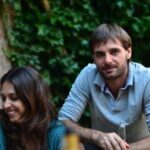 Dr. Raphael Aggio nasceu em São Paulo, Brasil e é bacharel em Ciências Biológicas pela Universidade Federal de Santa Catarina (UFSC). Depois disso, ele iniciou sua jornada internacional, concluindo um PhD em Ciências Biológicas pela University of Auckland (NZ) com foco em biologia de sistemas e metabolômica e, em seguida, tornou-se pesquisador assistente e pesquisador honorário na Universidade de Liverpool (Reino Unido). Nos últimos 5 anos, ele tem aplicado suas habilidades para apoiar o governo da Nova Zelândia. Ele é casado com Paulina Giraldo-Perez, que também é uma pesquisadora de carreira internacional na área de Ecologia Comportamental e Evolução. Paulina possui bacharelado pela UCLA (EUA) e mestrado e doutorado pela Universidade de Auckland (NZ). Eles criam dois lindos filhos em três línguas diferentes: inglês, português e espanhol. Por curiosidade, começou a estudar sobre Biohacking, ou técnicas para otimizar o corpo e a mente, e montou um podcast junto com sua esposa chamado “Biohackeando a vovó”. Neste seminário, Raphael irá compartilhar conosco suas experiências multilíngues no ambiente acadêmico, governamental e doméstico!
Dr. Raphael Aggio nasceu em São Paulo, Brasil e é bacharel em Ciências Biológicas pela Universidade Federal de Santa Catarina (UFSC). Depois disso, ele iniciou sua jornada internacional, concluindo um PhD em Ciências Biológicas pela University of Auckland (NZ) com foco em biologia de sistemas e metabolômica e, em seguida, tornou-se pesquisador assistente e pesquisador honorário na Universidade de Liverpool (Reino Unido). Nos últimos 5 anos, ele tem aplicado suas habilidades para apoiar o governo da Nova Zelândia. Ele é casado com Paulina Giraldo-Perez, que também é uma pesquisadora de carreira internacional na área de Ecologia Comportamental e Evolução. Paulina possui bacharelado pela UCLA (EUA) e mestrado e doutorado pela Universidade de Auckland (NZ). Eles criam dois lindos filhos em três línguas diferentes: inglês, português e espanhol. Por curiosidade, começou a estudar sobre Biohacking, ou técnicas para otimizar o corpo e a mente, e montou um podcast junto com sua esposa chamado “Biohackeando a vovó”. Neste seminário, Raphael irá compartilhar conosco suas experiências multilíngues no ambiente acadêmico, governamental e doméstico!
Dr. Raphael Aggio was born in São Paulo, Brazil and has a BSc in Biological Science from the Federal University of Santa Catarina. After that he started his international journey, completing a PhD in Biological Sciences from the University of Auckland (NZ) with focus on systems biology and metabolomics and then becoming a Researcher Assistant and honorary researcher at the University of Liverpool (UK). In the last 5 years, he has been applying his skills to support the central government of New Zealand. He is married to Paulina Giraldo-Perez, who is also an international researcher in the fields of Ecology Behaviour and Evolution. Paulina has a BSc degree from UCLA (USA) and a Master and PhD degree from the University of Auckland (NZ). They raise two beautiful children in three different languages: English, Portuguese and Spanish. For curiosity, he started studying Biohacking, or techniques to optimize body and mind, and started a podcast together with his wife called “Biohackeando a vovó”. In this seminar, Raphael will share with us his multilingual experiences in the academic, government, and home settings!
Andreia Santos Miranda
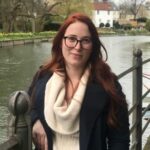 Andreia Santos Miranda é biomédica formada pela Universidade Federal do Piauí (UFPI), de nacionalidade portuguesa, de onde nasceu em Coimbra, Portugal, mudou-se para o Brasil com a família ainda bebê e estudou toda a sua vida até o fim de sua graduação. Foi durante sua graduação que Andreia iniciou seus estudos em um curso de inglês para aprimorar suas habilidades de comunicação no meio acadêmico. Ela é a fundadora e primeira presidente da Liga Acadêmica de Genética (LiAGen) com projetos de extensão dedicados à comunidade no ensino de genética. Ela recebeu um Prêmio de Excelência Acadêmica e Bacharelado em Ciências Biomédicas de Primeira Classe (2014-2018). Andreia também é mestre em Embriologia Clínica e Tecnologias de Reprodução Assistida pela University of Leeds (Inglaterra). Ela está atualmente realizando seu doutorado também na Universidade de Leeds, pesquisando o uso de biotecnologias para melhorar as tecnologias reprodutivas. Ela estuda os seguintes tópicos: preservação da fertilidade feminina, cultura de ovos e embriões, fertilização (FIV), biologia molecular e dispositivos microfluídicos. Andreia sonha em se tornar uma pesquisadora de renome na área de saúde reprodutiva da mulher.
Andreia Santos Miranda é biomédica formada pela Universidade Federal do Piauí (UFPI), de nacionalidade portuguesa, de onde nasceu em Coimbra, Portugal, mudou-se para o Brasil com a família ainda bebê e estudou toda a sua vida até o fim de sua graduação. Foi durante sua graduação que Andreia iniciou seus estudos em um curso de inglês para aprimorar suas habilidades de comunicação no meio acadêmico. Ela é a fundadora e primeira presidente da Liga Acadêmica de Genética (LiAGen) com projetos de extensão dedicados à comunidade no ensino de genética. Ela recebeu um Prêmio de Excelência Acadêmica e Bacharelado em Ciências Biomédicas de Primeira Classe (2014-2018). Andreia também é mestre em Embriologia Clínica e Tecnologias de Reprodução Assistida pela University of Leeds (Inglaterra). Ela está atualmente realizando seu doutorado também na Universidade de Leeds, pesquisando o uso de biotecnologias para melhorar as tecnologias reprodutivas. Ela estuda os seguintes tópicos: preservação da fertilidade feminina, cultura de ovos e embriões, fertilização (FIV), biologia molecular e dispositivos microfluídicos. Andreia sonha em se tornar uma pesquisadora de renome na área de saúde reprodutiva da mulher.
Andreia Santos Miranda is a biomedical scientist who graduated from the Federal University of Piauí (UFPI). She has Portuguese nationality, where she was born in a small town called Coimbra, Portugal and moved to Brazil along with her family as a baby and went on to study all her entire life until her graduation training. It was during her graduation that she started her studies in an English course to improve her scientific communication skills. She is the founder and first president of the Academic Genetics Society (LiAGen) with outreach projects dedicated to the community in teaching genetics. She is an Academic Excellence Award & First-Class BSc Biomedical Science (2014-2018). Andreia also holds a Master’s in Clinical Embryology and Assisted Reproduction Technologies from the University of Leeds, England. She is currently in England as a doctoral student at the University of Leeds, researching the use of biotechnologies to improve reproductive technologies. She studies the following topics: female fertility preservation, egg and embryo culture, fertilization (FIV), molecular biology, and microfluidic devices. Her dream is to become a well-known researcher in the field of women’s reproductive health.
Organizers
José Humberto da Cunha
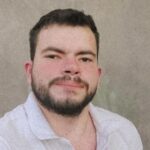 José Humberto da Cunha é acadêmico no curso de bacharelado em Biomedicina pela Universidade Federal do Delta do Parnaíba (UFDPAR). É membro da Liga Acadêmica de Genética (LiAGen) como cargo de Diretor Criativo e Publicidade e da Sociedade de Genética Americana (GSA). É membro integrante ao Laboratório de Genética Humana e Médica (GEHMED) como cargo de pesquisador do projeto sobre o estudo da prevalência e caracterização de distúrbios genéticos na população litoral piauiense e, assim como, atua na pesquisa dos genes relacionados ao alcoolismo verificando a susceptibilidade genética e a prevalência na população brasileira. Desenvolve uma divulgação científica pela internet (@liagen_ufdpar) com o enfoque de divulgar o conteúdo da genética de forma simples e didática ao público. Foi Embaixador Sênior pelo projeto de Ciências à Brasileirinha no setor de ciências da saúde. Faz parte do grupo ScienceBlogBr como apoio e divulgação científica. Desenvolve quatro projetos de extensão conhecidos por: Geneticista por Um Dia, Brincando com a Genética, Conexão LiAGen e Café com Genética. Estudou em cursos de genética nas férias nas seguintes instituições: USP, UFPR, UFG, PUC-GO, UNESP, UFRGS, UFSC. Realizou estágio em Análises Clínicas e estágio de Laboratório de Genética. Tem experiência como organizador de eventos presenciais e virtuais.
José Humberto da Cunha é acadêmico no curso de bacharelado em Biomedicina pela Universidade Federal do Delta do Parnaíba (UFDPAR). É membro da Liga Acadêmica de Genética (LiAGen) como cargo de Diretor Criativo e Publicidade e da Sociedade de Genética Americana (GSA). É membro integrante ao Laboratório de Genética Humana e Médica (GEHMED) como cargo de pesquisador do projeto sobre o estudo da prevalência e caracterização de distúrbios genéticos na população litoral piauiense e, assim como, atua na pesquisa dos genes relacionados ao alcoolismo verificando a susceptibilidade genética e a prevalência na população brasileira. Desenvolve uma divulgação científica pela internet (@liagen_ufdpar) com o enfoque de divulgar o conteúdo da genética de forma simples e didática ao público. Foi Embaixador Sênior pelo projeto de Ciências à Brasileirinha no setor de ciências da saúde. Faz parte do grupo ScienceBlogBr como apoio e divulgação científica. Desenvolve quatro projetos de extensão conhecidos por: Geneticista por Um Dia, Brincando com a Genética, Conexão LiAGen e Café com Genética. Estudou em cursos de genética nas férias nas seguintes instituições: USP, UFPR, UFG, PUC-GO, UNESP, UFRGS, UFSC. Realizou estágio em Análises Clínicas e estágio de Laboratório de Genética. Tem experiência como organizador de eventos presenciais e virtuais.
José Humberto da Cunha is an academic in the Bachelor’s Degree in Biomedicine at the Federal University of Delta do Parnaíba. He is a member of the Academic Genetics League as Creative and Advertising Director and the American Genetics Society. He is an integral member of the Laboratory of Human and Medical Genetics as a researcher in the project on the study of the prevalence and characterization of genetic disorders and, as well, he works in the research of genes related to alcoholism, verifying the genetic susceptibility and the prevalence in the Brazilian population. It develops a scientific dissemination on the internet with the focus of disseminating the content of genetics. He was Senior Ambassador for the Science project to Brasileirinha in the health sciences sector. He is part of the ScienceBlogBr group as support and scientific dissemination. He develops four extension projects known as: Geneticista por Um Dia, Brincando com a Genética, LiAGen Connection and Café com Genética. He studied genetics courses on vacation at the following institutions: USP, UFPR, UFG, PUC-GO, UNESP, UFRGS, UFSC. He held an internship in Clinical Analysis and an internship in the Genetics Laboratory. He has experience as a face-to-face and virtual event organizer.
Hindi
October 11, 10–11 a.m. Eastern Standard Time / 7:30 p.m. India Standard Time
Are you a Hindi-speaking scientist?
- Do you love science and have an interest in a career in genetics?
- Do you struggle to communicate your science in Hindi or in English?
- Are you considering getting involved in science communication in Hindi?
Our panel of experts—Dr. Pratima Sharma Pandey, Dr. Bal Krishnan, Avinash Sharma, Deepanshi Karwall—will share their experience and discuss how to choose career paths and engage in scientific conversations. Join us for the fourth session of the GSA Multilingual Seminar Series! The session will be held in Hindi.
क्या आप हिन्दी भाषी वैज्ञानिक हैं?
- क्या आप विज्ञान से प्यार करते हैं और आनुवंशिकी में आजीविका में रुचि रखते हैं?
- क्या आप अपने विज्ञान को हिंदी या अंग्रेजी में संचारित करने के लिए संघर्ष करते हैं?
- क्या आप हिंदी में विज्ञान संचार में शामिल होने पर विचार कर रहे हैं?
हमारे विशेषज्ञों का पैनल—डॉ प्रतिमा शर्मा पांडे, डॉ. बाल कृष्णन, अविनाश शर्मा, दीपांशी करवाल—अपने अनुभव साझा करेंगे और चर्चा करेंगे कि कैसे आजीविका के रास्ते चुनें और वैज्ञानिक बातचीत में शामिल हों।GSA बहुभाषी संगोष्ठी श्रृंखला के चौथे सत्र के लिए हमसे जुड़ें! सत्र हिंदी में आयोजित किया जाएगा।
Moderator
Aditi Sharma Singh, PhD
Dr. Aditi Sharma Singh, PhD, is a postdoctoral research scientist at Columbia University Medical Center, New York, USA. As an avid geneticist, she employs the model system of the common fruit fly (Drosophila melanogaster) in her studies, which are popular due to their short life cycle and genetic tractability. Aditi pursued her PhD from the Indian Institute of Science Education and Research, Kolkata, India. In her graduate studies, she delineated the role of the insulin signaling pathway in the collective movement of border cells during oogenesis. Currently, her research is focusing on understanding the mechanism of cell competition in Drosophila wing imaginal discs. She utilizes various state-of-the-art techniques like gene manipulation, time-lapse imaging, and confocal microscopy to address research questions that aid in dissecting the mechanisms perturbed during cancer metastasis and tumor generation. Her other interests include exploring the ways to communicate science in layman’s terms and also, creating a sustainable future through scientific developments. Outside of research, she enjoys reading, traveling, and adventure sports like skydiving.
डॉ अदिति शर्मा सिंह, पीएच.डी., कोलंबिया विश्वविद्यालय चिकित्सा केंद्र, न्यूयॉर्क, संयुक्त राज्य अमेरिका में पोस्ट-डॉक्टरेट अनुसंधान वैज्ञानिक हैं। एक उत्साही आनुवंशिकीविद् के रूप में, वह अपने अध्ययन में आम फल-मक्खी (ड्रोसोफिला मेलानोगास्टर) की मॉडल प्रणाली को नियोजित करती है, जो अपने छोटे जीवनचक्र और आनुवंशिक ट्रैक्टेबिलिटी के कारण लोकप्रिय हैं। अदिति ने अपनी पीएच.डी. भारतीय विज्ञान शिक्षा एवं अनुसंधान संस्थान, कोलकाता, भारत से प्राप्त की है। अपने स्नातक अध्ययनों में, उन्होंने अंडजनन के दौरान कोशिकाओं के सामूहिक आंदोलन में इंसुलिन सिग्नलिंग की भूमिका को चित्रित किया है। वर्तमान में, उनका शोध ड्रोसोफिला विंग डिस्क में कोशिका प्रतियोगिता के तंत्र को समझने पर ध्यान केंद्रित कर रही हैं। वह विभिन्न अत्याधुनिक तकनीकों जैसे जीन संपादन, टाइम-लैप्स इमेजिंग, और कॉन्फोकल माइक्रोस्कोपी का उपयोग अनुसंधान प्रश्नों को संबोधित करने के लिए करती है जो कैंसर मेटास्टेसिस और ट्यूमर पीढ़ी के दौरान तंत्र को विच्छेदित करने में सहायता करते हैं। उनकी अन्य रुचियों में विज्ञान को आम आदमी के लिये संप्रेषित करने के तरीकों की खोज करना और वैज्ञानिक विकास के माध्यम से एक स्थायी भविष्य बनाना शामिल है।शोध के अलावा, उन्हे पढ़ने, यात्रा करने और साहसिक खेलों में आनंद मिलता है।
Panelists
Pratima Sharma Pandey, PhD
Dr. Pratima Sharma Pandey, PhD, is a neuroscientist focusing on the cross modulatory mechanisms of neurotransmitters and neuromodulators in neuronal signaling, behavior, and diseases. She completed her PhD from the Institute of Microbial Technology, India. She gained her postdoctoral experience from the University of Alabama, Huntsville, and Delaware State University, USA. Currently, she is a scientist at the Department of Biological Sciences at the Indian Institute of Science Education and Research, Mohali. She utilizes C. elegans as a model organism that is popular due to its ease of genetics and also allows studies otherwise not possible in mammals. She employs several techniques ranging from CRISPR/CAS9 mediated gene editing, transcriptomics, fluorescence quantification of labeled proteins, chemical stimulation of genes/neurons, quantifiable behavioral assays, to name a few. She has published her scientific work in various prestigious journals. Presently, her research focuses on two general lines of investigations: The molecular mechanisms regulating neuronal signaling and connectivity in healthy neurons and aberrations in neuronal signaling and behavior during diseases and age-dependent neurodegeneration.
डॉ प्रतिमा शर्मा पांडे, पीएचडी, एक तंत्रिका जीव वैज्ञानिक हैं जो व्यवहार और रोगों में न्यूरोनल संकेतन में न्यूरोट्रांसमीटर और न्यूरोमोड्यूलेटर के क्रॉस मॉड्यूलेटरी नियामकतंत्र पर ध्यान केंद्रित कर रही हैं। उन्होंने अपनी पीएच.डी. माइक्रोबियल प्रौद्योगिकी संस्थान, भारत से प्राप्त की है । उन्होंने अलबामा विश्वविद्यालय, हंट्सविले और डेलावेयर स्टेट यूनिवर्सिटी, यूएसए से अपना पोस्टडॉक्टरल अनुभव प्राप्त किया। वर्तमान में, वह भारतीय विज्ञान शिक्षा एवं अनुसंधान संस्थान, मोहाली में जैविक विज्ञान विभाग में एक वैज्ञानिक हैं । वह सी. एलिगेंस को एक मॉडल जीव के रूप में उपयोग करती है जो आनुवंशिकी में आसानी के कारण लोकप्रिय है और साथ ही, जो अध्ययन करने की अनुमति देता है अन्यथा स्तनधारियों में संभव नहीं है। वह कई तकनीकों को नियोजित करती है उदाहरण के लिए CRISPR/CAS9 मध्यस्थता जीन संपादन, ट्रांसक्रिपटॉमिक्स, लेबल प्रोटीन की प्रतिदीप्ति मात्रा, जीन / न्यूरॉन्स की रासायनिक उत्तेजना, मात्रात्मक व्यवहार परख। उन्होंने विभिन्न प्रतिष्ठित पत्रिकाओं में अपने वैज्ञानिक कार्य प्रकाशित किए हैं। वर्तमान में, उनका शोध जांच की दो सामान्य पंक्तियों पर केंद्रित है: आणविक तंत्र स्वस्थ न्यूरॉन्स में न्यूरोनल सिग्नलिंग और कनेक्टिविटी को विनियमित करते हैं और न्यूरोनल सिग्नलिंग में विचलन और बीमारियों और उम्र-निर्भर न्यूरोडीजेनेरेशन के दौरान व्यवहार करते हैं।
Bal Krishan, PhD
Dr. Bal Krishnan is a protein biophysicist, currently at the Indian Institute of Science Education and Research, Berhampur (India). He obtained a Master’s degree in Zoology from Banaras Hindu University, Varanasi and a PhD in Molecular Biophysics from CSIR-Centre for Cellular and Molecular Biology, Hyderabad. After his PhD, he was awarded the National Post-Doctoral Fellowship from the Department of Science and Technology, GoI. Currently, he is a Visiting Scientist at the IISER Berhampur. Bal Krishnan has been studying the nature and dynamics of Ca2+-binding proteins in bacteria with a goal to understand the relationship in structure, function, and evolution. Apart from his core interest in fundamental questions of biology, he also enjoys other domains of science, and subjects of humanities, like philosophy and literature. As a scientist, teacher, and science communicator, Bal Krishnan believes that for the welfare of humankind, a scientific way of thinking should permeate the whole society and to this end, the scientific concepts can be best communicated to people through their own vocabulary.
वर्तमान में भारतीय विज्ञान शिक्षा एवं अनुसन्धान संस्थान बरहमपुर (भारत) में कार्यरत डॉ. बाल कृष्णन एक प्रोटीन भौतिक-जैव विज्ञानी हैं। इन्होंने स्नातकोत्तर की उपाधि काशी हिन्दू विश्वविद्यालय से जन्तु विज्ञान में अर्जित की थी, जिसके उपरान्त हैदराबाद के कोशिकीय एवं आण्विक जीव विज्ञान केन्द्र से आण्विक जैव-भौतिकी में पीएचडी सम्पन्न किया। पीएचडी पश्चात् बाल कृष्णन को शोध हेतु भारत सरकार के विज्ञान व प्रौद्योगिकी विभाग से राष्ट्रीय पोस्ट-डॉक्टरल अध्येतावृत्ति प्राप्त हुई। सम्प्रति ये IISER बरहमपुर में अतिथि वैज्ञानिक के रूप में कार्यरत हैं। बाल कृष्णन के शोध का विषय प्रोटीन की संरचना, कार्य व उद्विकास में अन्तर्सम्बन्ध समझने के दृष्टिकोण से जीवाणुओं में कैल्शियम-ग्राही प्रोटीनों की प्रकृति व व्यवहार का अध्ययन रहा है। जीव विज्ञान के आधारभूत प्रश्नों में प्रमुख रुचि के अतिरिक्त, इन्हें विज्ञान के अन्य आयाम, तथा मानविकी के विषय यथा दर्शन व साहित्य भी पसंद हैं। एक वैज्ञानिक, शिक्षक, व विज्ञान प्रसारक के रूप में बाल कृष्णन का विश्वास है कि मानवता के कल्याण हेतु वैज्ञानिक सोच का प्रसार समस्त समाज में होना आवश्यक है, तथा इसके लिए जनसामान्य की मातृभाषा सर्वश्रेष्ठ माध्यम है।
Avinash Sharma
Currently, Avinash Sharma is working as a Krietman PhD Fellow at Ben Gurion University of the Negev (BGU)-Israel. As a doctoral student, he is currently working in a plant molecular biology lab, where his primary focus is to understand posttranslational regulation of plant E3 ligases. He obtained his Master’s (M.S.) degree from the Indian Institute of Science Education and Research – Kolkata, (IISER-K) India where he submitted his thesis on “Optimizing neuronal differentiation from human Wharton Jelly derived Mesenchymal Stem Cells (WJ-MSCs)”. In 2017, at Jawaharlal Nehru University – New Delhi, India, he worked as a Junior Research Fellow in a structural biology lab on a project involving recombinant protein expression, purification, and protein crystallization derived from Mycobacterium tuberculosis. Before joining the plant molecular biology lab, Avinash worked in a cryo-electron microscopy lab at BGU where he gained hands-on experience in membrane protein purification, preparation of lipid nanodiscs, and cryo-EM data analysis. He has also worked in the field of host-pathogen interaction laboratory at IISER-K, where his work included cloning, expressing, and purifying the major Surface Exposed Colonization Proteins (SECPs) of vaccine potential from clinical samples of Campylobacter jejuni. Apart from being a passionate researcher, he has a keen interest in the fields of astronomy and human history. His hobbies include writing poems and stories in his native language (Hindi), drawing caricatures, and photography.
वर्तमान में इजराइल के बेन गुरियन विश्वविद्यालय – नेगेव में कार्यरत अविनाश शर्मा एक क्राइटमैन अधिछात्रवृत्ति प्राप्त पीएचडी छात्र है। बतौर पीएचडी छात्र, उनका शोध कार्य मुख्यतः पादप अणुजैविकी से सम्बंधित है जहाँ उनका लक्ष्य प्रोटीन अनुवादन के पश्चात होने वाली महत्वपूर्ण जैविक प्रक्रिया जिसे प्रोटीन यूबीक्वीटीनेशन कहते हैं उसके द्वारा पादपों में पाए जाने वाले एंजाइम E3 लाइगेस के विनियमन से है। अविनाश ने अपनी स्नातकोत्तर की उपाधि भारतीय विज्ञान शिक्षा एवं अनुसंधान संस्थान – कोलकाता, भारत से प्राप्त की जहाँ उन्होंने मानव गर्भनाल से व्युतपन्न मेसनकैमल स्टेम कोशिकाओं को तान्त्रिकोशिका में बदलने हेतु प्रोटोकॉल स्थापित किया और अपना शोध प्रबंध कार्य जमा किया। वर्ष २०१७ में इन्होने जवाहरलाल नेहरू विश्वविद्यालय, नई दिल्ली, (भारत) के संरचनात्मक जीव विज्ञान प्रयोगशाला में रहते हुए क्षयरोग कारक बैक्टीरिया-माइकोबैक्टीरियम ट्यूबर्क्युलोसिस के पुनः संयोजक प्रोटीन के अभिव्यक्ति, शुद्धि एवं क्रिस्टलीकरण शोध कार्य पर बतौर जूनियर रिसर्च फेलो के रूप में काम किया। पादप अणुजैविकी से पूर्व अविनाश ने बेन गुरियन विश्वविद्यालय में रहते हुए झिल्ली प्रोटीन संरचनात्मक जीव विज्ञान प्रयोगशाला में झिल्ली प्रोटीन की अभिव्यक्ति, शुद्धि एवं उनके नैनोडिस्क (चक्रिकाभ कणों) में निगमन तथा क्रायो इलेक्ट्रॉन माइक्रोस्कोप डाटा विश्लेषण से सम्बंधित अनुसंधान कार्य किया। पूर्व में उन्होंने रोगजनक बैक्टीरिया कमपायलोबैक्टीरियम जेजुनि से सम्बंधित प्रयोगशाला में अनुशंधान कार्य किया जहाँ उनका लक्ष्य बैक्टीरिया की सतह पर अभिव्यक्त उन सरंक्षित प्रोटीन की अभिव्यक्ति एवं शुद्धि से था जो के वैक्सीन निर्माण की दृष्टि से बेहद महत्वपूर्ण थी। एक अनुरक्त शोधार्थी होने के साथ-साथ, उन्हें खगोल विज्ञान तथा मानव इतिहास में बेहद रूचि है। हिंदी भाषा में कविता, लघु कथाओं और व्यंग-चित्र बनाने के साथ साथ उन्हें फोटोग्राफी का बड़ा शौका है।
Deepanshi Karwall
My name is Deepanshi Karwall, a budding microbiologist and a science enthusiast. I look forward to blending my love for science and for communication and writing into a successful way of bringing forward science to all the communities that have been deprived of its magic, in the finest way possible. Being a theatre artist, president of the Dramatics society and also the founder of the queer feminist collective for my university, I look forward to being the best and amalgamating all the prodigious traits of my personality into all my projects. My modus operandi is to discover science at a contextual level, design creative inputs, and communicate science to the world. Along with my zeal to work further in microbial and human genetics, I constantly look forward to learning new things, to discovering something as soon as I take a look into my fluorescence microscope. Science communication has become this inseparable part of my identity ever since I have discovered this important component of the science world, not just as a science student, but as a person, in general. I look forward to being a creative partner in all such opportunities that resonate with my raison d’être. Thankyou
मेरा नाम दीपांशी करवाल है। मैं जीव विज्ञान में स्नातक प्राप्त करने के रास्ते पर हूं। मैं सूक्ष्म जीव विज्ञान में खूब रुचि रखती हूं और अपने अंदर बसे हुऐ कलाकार के द्वारा पूरी दुनिया को दिलचस्प रास्तों से इन सब के बारे में बताना चाहती हूं।मैं क्वियर समुदाय की परेशानियों को गहराई से समझकर इस दुनिया के अंदर, जितना मैं अपने दम पर कर सकती हूं, उतना कर देना चाहती हूं, ताकी यह खूबसूरत दुनिया सबके लिए एक सुरक्षित जगह बन सके। मेरी ऐसी मान्यता है कि विज्ञान हमारे जीवन के हर सिरे से जुड़ा हुआ है और इसको अच्छे से समझ लेने से हमारा जीवन खूब बेहेतर बनाया जा सकता है।मैं यह आशा करती हूं कि मुझे एक मंच मिलता रहे ताकी मैं अपना फ़र्ज़ अदा कर सकू।धन्यवाद।
Organizers
Kaushal Kumar Bhati, PhD
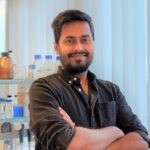 Dr. Kaushal Kumar Bhati is a plant molecular and cell biologist, currently working as postdoctoral scientist (funded by Charge de researcher-FNRS fellowship) at Louvain Institute of Biomolecular Sciences, University of Louvain (UCLouvain, Belgium). He obtained a Master’s degree in plant biotechnology from Banaras Hindu University, Varanasi and a PhD in from National Agri-food Biotechnology Institute (NABI), Mohali, funded by a fellowship from the Dept. of Biotechnology, Govt. of India. Before joining UCLouvain, for his first postdoctoral stay he worked at Copenhagen Plant Science Centre, University of Copenhagen, Denmark. He is exploring the autophagy regulation of plant stress-related proteins and molecular architecture around autophagosome initiation sites. Proximity proteomics, super resolution microscopy, and CRISPR based precise knock-in are the key technologies he is utilizing to answer these questions. His voluntary interests are community building, science communication, and philosophy of science. His hobbies include gardening, badminton, hiking, cooking, and literature.
Dr. Kaushal Kumar Bhati is a plant molecular and cell biologist, currently working as postdoctoral scientist (funded by Charge de researcher-FNRS fellowship) at Louvain Institute of Biomolecular Sciences, University of Louvain (UCLouvain, Belgium). He obtained a Master’s degree in plant biotechnology from Banaras Hindu University, Varanasi and a PhD in from National Agri-food Biotechnology Institute (NABI), Mohali, funded by a fellowship from the Dept. of Biotechnology, Govt. of India. Before joining UCLouvain, for his first postdoctoral stay he worked at Copenhagen Plant Science Centre, University of Copenhagen, Denmark. He is exploring the autophagy regulation of plant stress-related proteins and molecular architecture around autophagosome initiation sites. Proximity proteomics, super resolution microscopy, and CRISPR based precise knock-in are the key technologies he is utilizing to answer these questions. His voluntary interests are community building, science communication, and philosophy of science. His hobbies include gardening, badminton, hiking, cooking, and literature.
डॉ. कौशल कुमार भाटी एक पादप आणविक और कोशिका जीवविज्ञानी हैं, जो वर्तमान में पोस्ट-डॉक्टरल वैज्ञानिक (चार्ज डी रिसर्चर-एफएनआरएस फेलोशिप द्वारा वित्त पोषित) के रूप में लौवेन इंस्टीट्यूट ऑफ बायोमोलेक्यूलर साइंसेज, यूनिवर्सिटी ऑफ लौवेन (UCLouvain, बेल्जियम) कार्यरत हैं। उन्होंने बनारस हिंदू विश्वविद्यालय, वाराणसी से प्लांट बायोटेक्नोलॉजी में मास्टर डिग्री प्राप्त की और राष्ट्रीय कृषि-खाद्य जैव प्रौद्योगिकी संस्थान (NABI), मोहाली, भारत से पीएचडी (विभाग जैव प्रौद्योगिकी, भारत सरकार फेलोशिप)। पहले पोस्ट-डॉक्टरल प्रवास के लिए उन्होंने कोपेनहेगन प्लांट साइंस सेंटर, कोपेनहेगन विश्वविद्यालय, डेनमार्क में काम किया। वर्तमान में वह पादप तनाव संबंधी प्रोटीन के ऑटोफाजी (भोजी) विनियमन और ऑटोफैगोसोम दीक्षा स्थलों के आसपास आणविक वास्तुविद् की खोज कर रहे हैं। निकटता प्रोटिओमिक्स, सुपर रेज़ोल्यूशन माइक्रोस्कोपी CRISPR द्वारा सटीक जीनोम संपादन जैसी प्रमुख तकनीकों से इन सवालों के जवाब देने के लिए प्रयत्नशील है।उनके स्वैच्छिक हित सामुदायिक निर्माण, विज्ञान संचार और विज्ञान के दर्शन हैं। उनके शौक में बागवानी, बैडमिंटन, लंबी पैदल यात्रा, खाना बनाना और साहित्य शामिल हैं।
Aditi Sharma Singh, PhD
 Dr. Aditi Sharma Singh, PhD, is a postdoctoral research scientist at Columbia University Medical Center, New York, USA. As an avid geneticist, she employs the model system of the common fruit fly (Drosophila melanogaster) in her studies, which are popular due to their short life cycle and genetic tractability. Aditi pursued her PhD from the Indian Institute of Science Education and Research, Kolkata, India. In her graduate studies, she delineated the role of the insulin signaling pathway in the collective movement of border cells during oogenesis. Currently, her research is focusing on understanding the mechanism of cell competition in Drosophila wing imaginal discs. She utilizes various state-of-the-art techniques like gene manipulation, time-lapse imaging, and confocal microscopy to address research questions that aid in dissecting the mechanisms perturbed during cancer metastasis and tumor generation. Her other interests include exploring the ways to communicate science in layman’s terms and also, creating a sustainable future through scientific developments. Outside of research, she enjoys reading, traveling, and adventure sports like skydiving.
Dr. Aditi Sharma Singh, PhD, is a postdoctoral research scientist at Columbia University Medical Center, New York, USA. As an avid geneticist, she employs the model system of the common fruit fly (Drosophila melanogaster) in her studies, which are popular due to their short life cycle and genetic tractability. Aditi pursued her PhD from the Indian Institute of Science Education and Research, Kolkata, India. In her graduate studies, she delineated the role of the insulin signaling pathway in the collective movement of border cells during oogenesis. Currently, her research is focusing on understanding the mechanism of cell competition in Drosophila wing imaginal discs. She utilizes various state-of-the-art techniques like gene manipulation, time-lapse imaging, and confocal microscopy to address research questions that aid in dissecting the mechanisms perturbed during cancer metastasis and tumor generation. Her other interests include exploring the ways to communicate science in layman’s terms and also, creating a sustainable future through scientific developments. Outside of research, she enjoys reading, traveling, and adventure sports like skydiving.
डॉ अदिति शर्मा सिंह, पीएच.डी., कोलंबिया विश्वविद्यालय चिकित्सा केंद्र, न्यूयॉर्क, संयुक्त राज्य अमेरिका में पोस्ट-डॉक्टरेट अनुसंधान वैज्ञानिक हैं। एक उत्साही आनुवंशिकीविद् के रूप में, वह अपने अध्ययन में आम फल-मक्खी (ड्रोसोफिला मेलानोगास्टर) की मॉडल प्रणाली को नियोजित करती है, जो अपने छोटे जीवनचक्र और आनुवंशिक ट्रैक्टेबिलिटी के कारण लोकप्रिय हैं। अदिति ने अपनी पीएच.डी. भारतीय विज्ञान शिक्षा एवं अनुसंधान संस्थान, कोलकाता, भारत से प्राप्त की है। अपने स्नातक अध्ययनों में, उन्होंने अंडजनन के दौरान कोशिकाओं के सामूहिक आंदोलन में इंसुलिन सिग्नलिंग की भूमिका को चित्रित किया है। वर्तमान में, उनका शोध ड्रोसोफिला विंग डिस्क में कोशिका प्रतियोगिता के तंत्र को समझने पर ध्यान केंद्रित कर रही हैं। वह विभिन्न अत्याधुनिक तकनीकों जैसे जीन संपादन, टाइम-लैप्स इमेजिंग, और कॉन्फोकल माइक्रोस्कोपी का उपयोग अनुसंधान प्रश्नों को संबोधित करने के लिए करती है जो कैंसर मेटास्टेसिस और ट्यूमर पीढ़ी के दौरान तंत्र को विच्छेदित करने में सहायता करते हैं। उनकी अन्य रुचियों में विज्ञान को आम आदमी के लिये संप्रेषित करने के तरीकों की खोज करना और वैज्ञानिक विकास के माध्यम से एक स्थायी भविष्य बनाना शामिल है।शोध के अलावा, उन्हे पढ़ने, यात्रा करने और साहसिक खेलों में आनंद मिलता है।
Spanish
Friday, September 3, 2021, 5:30 p.m. EDT
Are you a Spanish-speaking scientist?
- Do you love science and have an interest in a career in genetics?
- Do you struggle to communicate your science in Spanish or in English?
- Are you considering getting involved in science communication in Spanish?
Our panel of experts—Javier Blanco, Roberto Carballido, Attabey Rodriguez-Benitez—will share their experience and discuss how to choose career paths and engage in scientific conversations. Join us for the third session of the GSA Multilingual Seminar Series! The session will be held in Spanish.
- ¿Eres un científico de habla hispana?
- ¿Te gusta la ciencia y te interesa una carrera en genética?
- ¿Te cuesta trabajo comunicar tu ciencia en español o en inglés?
- ¿Has considerado involucrarte en divulgación científica en español?
Nuestro panel de expertos – Javier Blanco, Roberto Carballido, Attabey Rodríguez-Benitez – compartirán sus experiencias y discutirán cómo escoger trayectorias y cómo abordar conversaciones sobre ciencia. ¡Participa en esta tercera sesión de la Serie de Seminarios Multilingües de GSA! Esta sesión se llevará a cabo en español.
Moderator:
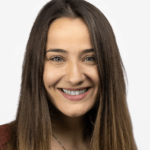
Carla Bautista Rodríguez
Carla is a PhD candidate at Laval University in Quebec, Canada. She is interested in evolutionary biology but has also always been passionate about astronomy. She focused her career on astrobiology since it combines both disciplines to study life in extreme environments both on and off the planet. Currently, her research focuses on hybridization between species and how this process affects adaptation to extreme conditions.
Carla es una alumna de doctorado en la Universidad Laval en Québec (Canadá). Entre sus intereses se encuentra la biología evolutiva así como la astronomía. Es por ello que enfocó su carrera en la astrobiología ya que combina ambas disciplinas para estudiar la vida en ambientes extremos tanto dentro como fuera del planeta. Actualmente, su investigación se centra en la hibridación entre especies y cómo este proceso afecta la adaptación a condiciones extremas.
Connect with Carla Bautista Rodríguez on LinkedIn.
Panelists:

Attabey Rodríguez Benítez, PhD
Dr. Attabey Rodríguez Benítez, PhD (she/her/ella), is a biochemist, science writer, and editor. She completed her PhD in Chemical Biology at the University of Michigan and was formerly a 2020 AAAS Mass Media Fellow at Science Friday. Now, she is the newest writer and editor for the YouTube show “SciShow,” where she shapes the channel’s content. She has written articles from multiple outlets like ACS Central Science, CellPress, Massive Science, and Science Friday. You can find her on Instagram and Twitter, as @ScienceBey, where she shares content related to the science behind nature, science communication, and graduate life.
La doctora Attabey Rodríguez Benítez es bioquímica, editora y escritora de ciencias. Ella completó su doctorado(PhD) en Biología Química de la Universidad de Michigan. También en el año del 2020 formó parte del AAAS-2020 donde fue parte de los medios de comunicación. Actualmente, se desempeña como escritora y editora del canal de YouTube SciShow, donde le da forma al contenido de dicho canal. Attabey ha escrito artículos de múltiples medios como ACS Central Science, CellPress, Massive Science y Science Friday. Puedes encontrar más información sobre ella en sus cuentas de Instagram y Twitter, como ScienceBay, donde comparte contenido relacionado a las ciencias detrás de la Naturaleza, comunicación sobre las ciencias y la vida graduada.
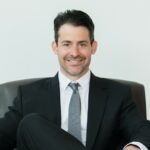
Roberto Carballido,SHRM-SCP
Diversity talent scout and advocate
Eli Lilly and Company
Roberto is originally from the state of Oaxaca, Mexico. At an early age, he participated and was dedicated to organizing events of improvement and leadership for marginalized young people in his state. At the age of seventeen, Roberto was a political activist and youth representative of the National Action Party, he participated in campaigns to defend democracy and the vote in his country. He completed his studies at Tec de Monterrey and Universidad Pontificia Comillas.
Roberto moved to the United States fourteen years ago, without friends, savings, or English, but believing in the American dream. Since his arrival, he has dedicated himself to working and improving the lives of the people around him. After more than a decade of challenges and sacrifices, Roberto is dedicated to connecting Latinx talent with career opportunities. He informed his connections of the benefits that the Latino community can bring to the state. Roberto is a faithful promoter of inclusiveness and technology. He firmly believes that the Latino community is and will be a core part of the development and prosperity of this country to improve everybody’s life.
Roberto es originario del estado de Oaxaca, México, a su temprana edad participó y se dedicó a organizar eventos de superación y liderazgo para jóvenes marginalizados en su estado. A sus 17 años Roberto fue un activista político y representante juvenil del Partido Acción Nacional, participó en campañas para defender la democracia y el voto en su país. Él completó sus estudios en el Tec de Monterrey y la Universidad Pontificia Comillas.
Roberto se mudó a los Estados Unidos hace 14 años, sin amigos, sin ahorros, y sin inglés, pero creyendo en el sueño americano. Desde su llegada se ha dedicado a trabajar y a mejorar las vidas de las personas a su alrededor. Después de más de una década de retos y sacrificios, Roberto se está dedicado a conectar talento Latinx con oportunidades profesionales, e informado a sus conexiones de los beneficios que la comunidad latina puede traer al estado. Roberto es un fiel promotor de la inclusividad y la tecnología y cree firmemente que la comunidad latina es y va a ser parte medular del desarrollo y prosperidad de este país para mejorar la vida de todos.

Javier G. Blanco. Clin. Biochemistry, PhD
Professor
School of Pharmacy and Pharmaceutical Sciences. State University of New York at Buffalo.
Dr. Blanco is a Professor in the School of Pharmacy and Pharmaceutical Sciences at the State University of New York (SUNY-Buffalo). He has more than 18 years of experience in the study of pharmacogenetics of pediatric and adult cancers. Dr. Blanco is originally from Argentina, graduated as a clinical biochemist and doctor in chemical sciences from the National University of Córdoba, Argentina. He completed his postdoctoral training at St. Jude Children’s Research Hospital under the direction of Dr. Mary V. Relling. Currently, he is principal investigator of projects funded by the National Institutes of Health of the United States (NIH) continuously and by competition since 2005. His projects combine basic laboratory studies, pharmacogenetic analysis in collections of human samples derived from special groups, and clinical studies in pediatric and adult cancer patients. Dr. Blanco has published more than 60 articles in specialized journals, is a member of scientific societies and professional organizations, editor of the journal Cardio-oncology, and a member of the “Integrative Myocardial Physiology / Pathophysiology” panel at NIH.
El Dr. Blanco es Profesor en la Escuela de Farmacia y Ciencias Farmacéuticas en la Universidad del Estado de Nueva York (SUNY-Buffalo), y cuenta con más de 18 años de experiencia en la investigación de la farmacogenética de cánceres pediátricos y adultos. El Dr. Blanco es originario de Argentina, se graduó de bioquímico clínico y doctor en ciencias químicas en la Universidad Nacional de Córdoba, Argentina. Completó su entrenamiento postdoctoral en el Hospital St. Jude Children’s Research Hospital bajo la dirección de la Dra. Mary V. Relling. Actualmente, es investigador principal de proyectos financiados por los Institutos Nacionales de la Salud de los Estados Unidos (NIH) de manera continua y por competición desde el año 2005. Sus proyectos combinan estudios básicos de laboratorio, análisis farmacogenéticos en colecciones de muestras humanas derivadas de grupos especiales y estudios clínicos en pacientes pediátricos y adultos con cáncer. El Dr. Blanco ha publicado más de 60 artículos en revistas especializadas, es miembro de sociedades científicas y organizaciones profesionales, editor de la revista Cardio-oncology y miembro del panel “Integrative Myocardial Physiology/Pathophysiology” en NIH.
Organizers:
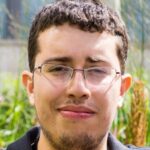
Angel F. Cisneros Caballero
Angel is a PhD student at Laval University in Québec City, Canada. His research focuses on the evolution of protein-protein interactions and gene duplication.
Angel es un alumno de doctorado en la Universidad Laval en Québec, Canadá. Su investigación se centra en la evolución de las interacciones proteína-proteína y la duplicación de genes.
Connect with Angel F. Cisneros Caballero on LinkedIn.

Carla Bautista Rodríguez
Carla is a PhD candidate at Laval University in Quebec, Canada. She is interested in evolutionary biology but has also always been passionate about astronomy. She focused her career on astrobiology since it combines both disciplines to study life in extreme environments both on and off the planet. Currently, her research focuses on hybridization between species and how this process affects adaptation to extreme conditions.
Carla es una alumna de doctorado en la Universidad Laval en Québec (Canadá). Entre sus intereses se encuentra la biología evolutiva así como la astronomía. Es por ello que enfocó su carrera en la astrobiología ya que combina ambas disciplinas para estudiar la vida en ambientes extremos tanto dentro como fuera del planeta. Actualmente, su investigación se centra en la hibridación entre especies y cómo este proceso afecta la adaptación a condiciones extremas.
Connect with Carla Bautista Rodríguez on LinkedIn.
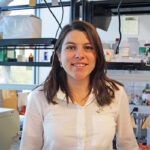
Romina B. Cejas
Romina is a cellular & molecular biologist that is now working as a postdoctoral researcher in the Department of Pharmaceutical Sciences at the School of Pharmacy and Pharmaceutical Sciences, SUNY Buffalo. Her research interests include: 1) characterization of genetic and epigenetic factors linked to variable drug action and toxicity, and 2) analysis of subcellular transport with emphasis on protein biologics and implementation of advanced microscopy techniques.
Romina es una bióloga celular y molecular que trabaja como investigadora postdoctoral en el Departamento de Ciencias Farmacéuticas de la Facultad de Farmacia y Ciencias Farmacéuticas, SUNY Buffalo (USA). Sus intereses incluyen: 1) caracterización de factores genéticos y epigenéticos relacionados con la acción y toxicidad variable de fármacos, y 2) análisis del transporte subcelular con énfasis en biológicos de proteínas e implementación de técnicas avanzadas de microscopía.
Connect with Romina B. Cejas on LinkedIn.
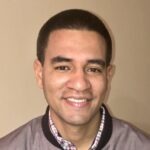
Juan D. Rodríguez
Juan Daniel Rodriguez-Rivera is a PhD candidate in the Department of Cell Biology at Emory University in Atlanta, Georgia. His current research is in C. elegans to study how epigenetic modifications can regulate embryo development and cell fate determination. Prior to his doctoral admission, he earned his master’s degree in integrated biology at Kennesaw State University in Georgia, studying the role of the proton channel in the bioluminescent dinoflagellate species. From this work, he earned his first author publication. Before that, he obtained his bachelor’s degree in Biomedical Science from the InterAmerican University of Puerto Rico. Last year, Juan was selected to be part of the Yale Ciencia Academy ’20, using the knowledge from this program he organized multiple outreach activities with different universities of Puerto Rico. At Emory, Juan has been actively involved with the Hispanic community. As an elected President of the Latinx Graduate Student Association, one of his goals is to support Emory-Latinx students and recruit more Latinx to the Emory graduate programs.
Juan Daniel Rodriguez-Rivera es un estudiante de doctorado en el Departamento de Biología Celular en la Universidad de Emory en Atlanta, Georgia. Su investigación está enfocada en el estudio epigenético y sus modificaciones durante el desarrollo del embrionario del gusano microscópico, C. elegans. Previo a su doctorado, El obtuvo su maestría en biología de la Universidad de Kennesaw en Georgia. Por este trabajo, el obtuvo su primera publicación como primer autor. Juan es original de Puerto Rico, lugar donde obtuvo su grado de bachillerato en ciencias biomédicas, de la Universidad Interamericana de Puerto Rico. El año pasado Juan fue seleccionado para participar en el programa de Yale Ciencia Academy’20. Utilizando el conocimiento obtenido, organizó varios programas para estudiantes de distintas universidades de Puerto Rico. Actualmente Juan está activamente trabajando con la comunidad hispana en Emory. Como presidente de la asociación de estudiantes Latinx postgraduados, sus metas son dar apoyo a los estudiantes hispanos y reclutar más estudiantes hispanos para los programas graduados en Emory.
Farsi
Friday, July 30, 2021, 1–2 p.m. EDT
Are you a Farsi speaking geneticist?
Do you love science and have an interest in a career in genetics?
Do you struggle communicating your science in Farsi?
Our panel of experts—Dr. Mojgan Padash, Dr. Mohammad R. Akbari, Dr. Narjes Yousefi, and Dr. Ahmadreza Katuzian—will discuss why they chose their career paths and how they engage in scientific conversations in Farsi during the Second session of the GSA Multilingual Seminar Series!
آیا شما یک محقق ژنتیک فارسی زبان هستید؟ آیا شما به علم علاقه داشته و دوست دارید در حوزه ی ژنتیک کار کنید؟ آیا توضیح کارهای علمیتان به زبان فارسی برای شما سخت است؟ پنل متخصصان ما، دکتر مژگان پاداش، دکتر محمدرضا اکبری، دکتر نرجس یوسفی و دکتر احمدرضا کاتوزیان، در دومین سمینار از سری سمینارهای چند زبانه ی GSA در مورد این که چرا این حوزه را انتخاب کردند و چگونه گفتگوهای علمی به زبان فارسی دارند بحث خواهند کرد. پنل متخصصان ما، دکتر مژگان پاداش، دکتر محمدرضا اکبری، دکتر نرجس یوسفی و دکتر احمدرضا کاتوزیان، در دومین در مورد این که چرا این حوزه را انتخاب کردند و چگونه گفتگوهای علمی GSA سمینار از سری سمینارهای چند زبانه ی .به زبان فارسی دارند بحث خواهند کرد
After registering, you will receive a confirmation email containing information about joining the meeting.
Moderator:
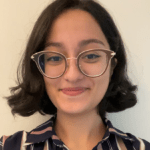
Nastaran Moarefi
As a plant geneticist, some of my research interests include polymorphism and the effects of heavy metal toxicity. For my undergrad thesis, I worked on developing species-specific molecular markers for white birch and bog birch in the Greater Sudbury Region, Canada. As for my master’s thesis, I examined the effects of Ni toxicity on the differential gene expression of eastern white pine and jack pine.
(Polymorphism) به عنوان یک محقق در زمینه ژنتیک گیاهان، علایق من شامل پلی مورفیسم است. موضوع تز لیسانس علوم پایه من در مورد (Gene Expression) و اثرات سمی فلزات سنگین برنمایه ژن و توس مرداب (White Birch) ویژه گونه های توس سفید (Markers Molecular) یافتن نشانگرهای مولکلی (Ontario) در استان انتاریو (City of Sudbury Greater) در ناحیه سادبری بزرگ (Bog Birch) است. لازم به ذکر است که موضوع تز فوق لیسانس من نیز بررسی وتحقیق در مورد اثرات سمی نیکل برنمایه متفاوت ژنی .می باشد (Jack Pine)وکاج جک (Pine Eastern White) کاج سفید شرقی (Differential Gene Expression)
Panelists:
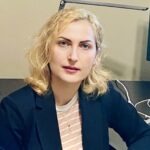
Mojgan Padash, PhD
Dr. Padash is an assistant professor in Department of Biology at The University of Oklahoma. She utilizes fruit flies to study human cancer. You may wonder why fruit flies and how could human cancer be relevant to fruit flies?! Yes, fruit flies are extremely valuable for studying human genes and diseases including cancer. More than 70% of human disease genes have evolutionarily conserved homologs in flies. Most signal transduction pathways and molecular mechanisms involved in cell growth, division, and migration are also well conserved in flies. Furthermore, low handling cost, short life cycle, valuable genetic techniques and tools as well as simplicity are other unique features that fruit flies offer to facilitate the understanding of mechanisms underlying human diseases. Dr. Padash’s lab focuses on the cancer caused by human papillomavirus (HPV). High-risk HPVs are the leading cause of cervical cancer for which there are currently no effective therapeutics. This has caused high death to incidence ratio worldwide. New treatment strategies are needed to improve this high death to incidence ratio. Dr. Padash has modeled HPV-induced cancer in fruit flies and interested in answering questions related to the mechanism of HPV action in epithelial cells as well as identifying novel therapeutic targets for HPV-induced cancers.
دکتر پاداش استادیار گروه زیست شناسی در دانشگاه اوکلاهما است. او از مگس سرکه برای مطالعه سرطان انسان استفاده می کند. ممکن است تعجب کنید که چرا مگس سرکه و چگونه سرطان انسان می تواند به مگس سرکه مرتبط باشد ؟! بله ، مگس سرکه برای مطالعه ژن ها و بیماری های انسانی از جمله سرطان بسیار ارزشمند است. بیش از ۷۰٪ ژن های بیماری انسان در مگسها مشابهشان یافت میشود. اکثر مسیرهای انتقال سیگنال و مکانیسم های مولکولی که در رشد ، تقسیم و مهاجر ،ت سلول نقش دارند نیز در مگس به شکل مشابه موجود میباشند. علاوه بر این ، هزینه پایین نگهداری ، چرخه کوتاه زندگی تکنیک ها و ابزارهای ارزشمند ژنتیکی و همچنین پیچیدگی نسبتاً کم از دیگر ویژگی های منحصر به فردی است که مگس سر که برای تسهیل درک مکانیسم های اساسی بیماری های انسانی ارائه می دهد. آزمایشگاه دکتر پاداش بر روی سرطان ناشی از های پرخطر علت اصلی سرطان دهانه رحم میباشند که در حال حاضر HPV.تمرکز دارد (HPV) ویروس پاپیلومای انسانی هیچ روش درمانی موثری برای آنها وجود ندارد. این امر باعث شده است که نسبت مرگ و میر در بیماران در سراسر جهان زیاد باشد. برای پایین آوردن این نسبت بالای مرگ و میر به استراتژی های درمانی جدید نیاز است. دکتر پاداش سر را در مگس سرکه الگوبرداری کرده و علاقه مند به پاسخگویی به سوالات مربوط به مکانیسم عملکرد HPV طان ناشی از .است HPV در سلولهای اپیتلیال و همچنین شناسایی روشهای درمانی جدید برای سرطانهای ناشی از HPV
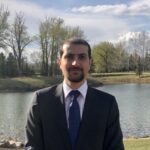
Ahmad Reza Katouzian, PhD
I have a PhD in systematic biology from the University of Tehran. In my doctorate thesis I focused on Gammarus komareki, a kind of freshwater amphipod, in Iran. Working with Prof. Alireza Sari, Prof. Florian Leese and Dr. Alexander M. Weigand, I uncovered a much higher biodiversity of the freshwater amphipods in the area and proposed the presence of many more previously undiscovered new and endemic species. My work is specifically focused on application of molecular, geometric and morphometric methods in uncovering previously overlooked wild identities including species and subspecies. Using such methods as molecular delimitation approaches, I try to present a more comprehensive overview of biodiversity in all its three levels. I am specifically interested in freshwater systems and macrobenthic invertebrates, in particular Amphipoda. I have been actively involved in teaching courses like biodiversity, zoology, role of molecular approaches in zoology and biostatistics at the University. I am a Professional Biologist member of the Alberta Society of Professional Biologists (ASPB).
دکتری من در بیوسیستماتیک جانوری از دانشگاه تهران است. در پایان نامه دکترای من تمرکز خود را بر روی ، نوعی دوجورپای آب شیرین ، در ایران گذاشتم. با کار با پروفسور komareki Gammarus من تنوع زیستی ،Alexander M. Weigand و دکتر Florian Leese علیرضا ساری، پروفسور بسیار بالاتری از دوجورپایان آب شیرین را در منطقه مورد مطالعه کشف کردم و حضور بسیاری از گونه های جدید و بومی که قبلا کشف نشده بودند را گزارش کردم. کار من به طور خاص در استفاده از روش های مولکولی ، هندسی و ریخت سنجی در کشف هویت های قبلا نادیده گرفته شده از جمله گونه ها و زیرگونه ها متمرکز شده است. من با استفاده از روشهایی مانند رویکردهای تعیین حدود مولکولی، سعی می کنم دیدگاهی جامع تر بر تنوع زیستی در هر سه سطح آن ارایه دهم. من به طور خاص به سیستم های آب شیرین و بی مهرگان آب ،شیرین به ویژه دوجورپایان علاقه مند هستم. در حوزه آموزش٬ من تدریس دروسی مانند تنوع زیستی .جانورشناسی ، نقش رویکردهای مولکولی در جانورشناسی و آمار زیستی در دانشگاه را به عهده داشته ام .در حال حاضر٬ من عضو فعال جامعه زیست شناسان حرفه ای آلبرتا هستم
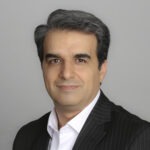
Mohammad R. Akbari, MD, PhD
Dr. Akbari is an assistant professor at the Dalla Lana School of Public Health, University of Toronto (U of T), and a scientist at Women’s College Research Institute (WCRI), Women’s College Hospital (WCH). He is also an adjunct faculty member at Institute of Medical Science, faculty of Medicine, University of Toronto and the director of the Molecular Genetics Research Laboratory at Women’s College Hospital. Dr. Akbari’s research interest is in studying genetic susceptibility to cancers, including breast, ovarian, esophageal, colon, pancreas and prostate cancers. This includes identifying new genes responsible for hereditary cancers, defining the role of known cancer genes, and individualizing cancer treatments for patients carrying a genetic mutation. One of the key focuses of his research program is to incorporate our current knowledge of cancer genetics into population strategies for reducing cancer burden by improving the current models of offering genetic screening for hereditary cancers. The Screen Project co-led by Dr. Akbari studies the feasibility of population-based screening for hereditary breast and ovarian cancers in Canada. Dr. Akbari has published over 120 peer-reviewed papers in his relatively short career; some of them are in prestigious journals such as Nature Genetics, Journal of National cancer Institute (JNCI) and JAMA Oncology. Among them is the identification of a new breast cancer susceptibility gene named RECQL published in 2015 in Nature Genetics Journal. Dr. Akbari has been also active in building population-based genomic variation databases, which are crucial in advancing our genetic knowledge in human disorders. He co-led an initiative to establish a genomic variation database of ethnic groups that live in Iran as a representative of the Middle Eastern population, which is underrepresented in most international genomic databases. The first phase of this database, called Iranome, was made available to the scientific community with samples from eight different ethnic groups in March 2018.
و محقق موسسه تحقیقاتی کالج (U of T) در دانشگاه تورنتو Dalla Lana دکتر اکبری استادیار دانشکده بهداشت عمومی است. ایشان همچنین استاد مدعو انستیتوی علوم پزشکی در دانشکده ،(WCH) بیمارستان کالج زنان ،(WCRI) زنان پزشکی دانشگاه تورنتو و مدیر آزمایشگاه تحقیقات ژنتیک مولکولی در بیمارستان کالج زنان است. دکتر اکبری علاقمند به تحقیق بر عوامل ژنتیکی ایجاد سرطان ها، از جمله سرطانهای پستان، تخمدان، مری، روده بزرگ، لوزالمعده و پروستات است. مطالعات ایشان شامل شناسایی ژن های جدید مسئول سرطان های ارثی، تعیین نقش ژن های شناخته شده سرطان و شخصی سازی درمان های سرطان برای بیمارانی است که جهش ژنتیکی دارند. یکی از محورهای اصلی برنامه تحقیقاتی دکتر اکبری، بهبود مدل های فعلی ارائه غربالگری ژنتیکی برای سرطان های ارثی و گنجاندن دانش فعلی ما در مورد ژ (The Screen Project) نتیک سرطان در استراتژی های جمعیتی برای کاهش بار سرطان است. پروژه غربالگری در کانادا با مدیریت مشترک دکتر اکبری امکان غربالگری جمعیت را برای سرطان های ارثی پستان و تخمدان بررسی می ،Nature Genetics JNCI, JAMA Oncologyکند. دکتر اکبری بیش از 130 مقاله در مجله های معتبر علمی از جمله 2015 می باشد که در سال RECQL منتشر کرده است. از جمله کارهای مهم ایشان کشف ژن دخیل در سرطان پستان به نام منتشر شده است. دکتر اکبری همچنین در ایجاد پایگاه داده های تنوع ژنتیکی جمعیت، که Nature Genetics در ژورنال در پیشرفت دانش ژنتیکی ما در اختلالات انسانی بسیار مهم است، فعال بوده است. ایشان مدیریت مشترک یک طرح نوین برای ایجاد یک پایگاه داده تنوع ژنتیکی از اقوام ایرانی، به عنوان نماینده جمعیت خاورمیانه، را برعهده دارند. اکثر پایگاه های داده ژنتیکی بین المللی داده های اندکی در مورد مردم خاورمیانه دارند. مرحله اول این پایگاه داده با نام ایرانوم، با نمونه هایی از .هشت گروه قومی مختلف در مارس 2018 در دسترس جامعه علمی قرار گرفته است
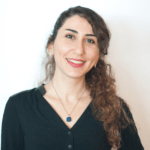
Narjes Yousefi, PhD
I am a postdoc at the University of Zürich, Switzerland. My research focuses on population genetics, genome architecture and evolution of supergenes in plants. For my PhD thesis at the Norwegian University of Science and Technology (NTNU, Norway) I worked on population genetics and speciation in peat mosses (genus Sphagnum), which store one third of the Earth’s terrestrial soil carbon, hence important in climate change. For my PhD, I used Next Generation Sequencing (NGS) techniques and I continued to use state-of-the-art methods to understand the complexity of the genome. For my PostDoc, I am using primroses (genus Primula) to study the origin, evolution and breakdown of supergenes. A classical example of supergenes in plants is the S-locus in Primula which controls the heterostyly –presence of two flower morphs in the population with reciprocal positions of anthers and stigmas. During my PostDoc, I am generating several chromosome-level genomes of Primula species to explore the origin and assembly of the S-locus. Furthermore, I will use these genomes together with several other plant genomes to explore the evolution of 3-D structure of the genome in plants. I also teach NGS techniques and bioinformatics at the University of Zürich.
من در حال گذراندن دوره ی فوق دکتری در دانشگاه زوریخ، سوئیس هستم. تحقیقات من شامل ژنتیک جمعیت، ساختار سه بعدی ژنوم و تکامل سوپرژنهاست. من در دوره ی دکتری در دانشگاه علوم و تحقیقات نروژ روی ژنتیک جمعیت و گونه زایی در پیت ماس کار کردم. گیاه پیت ماس از خزه گیان هست و با ذخیره کردن بیش از یک سوم کربن خاک روی کره زمین اهمیت زیادی در تغییرات اقلیمی دارد. من در دوره دکترا و فوق دکترا از جدیدترین تکنیک های توالی یابی استفاده کردم تا به درک پیچیدگی های ژنوم کمک کنم. در دوره ی فوق دکتری، من روی تکامل سوپرژن در گونه های پامچال کار میکنم. یک مثال کلاسیک سوپرژن ها در گیاهان، اس-لوکوس در پامچال هست که فرم گل را کنترل میکند. درحال حاضر من ژنوم هایی با کیفیت بالا از چندین گونه پامچال تهیه کردم که به درک بهتر ساختار ژنتیکی این سوپرژن کمک میکند. به علاوه، من از این ژنوم ها در مطالعه و فهمیدن ساختار سه بعدی ژنوم در گیاهان استفاده میکنم. من همچنین در تدریس .تکنیک های توالی یابی جدید و بیوانفورماتیک در دانشگاه زوریخ فعالیت دارم
Organizers:
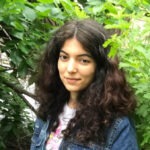
Mehrnaz Afkhami
I am a PhD candidate at the University of Oklahoma, department of biology. I study the genetic and neurobiology of coevolution in the female Drosophila.
من کاندیدای دکتری در دپارتمان زیست شناسی دانشگاه اکلاهما هستم. موضوع تحقیق من زمینه های ژنتیکی و نورونی .تکامل همراه در مگس سرکه ی ماده است
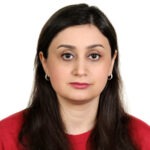
Parinaz Khalilzadeh
Parinaz is a graduate student in biology at Laurentian University, Canada. She is into research questions related to wildlife conservation genetics, population genetics and evolution. Her current project is on northern leopard frog’s conservation genetics in western Canada. She also did a masters in biodiversity and habitats at Gorgan University, Iran and her investigation was on Iranian wild boars genetic diversity.
در حال حاضر، پریناز دانشجوی ارشد در دانشگاه لورنشن کانادا است و پروژه پایان نامه او در ارتباط با ژنتیک حفاظت قورباغه پنگلی آمریکای شمالی می باشد. همچنین، او فارغ التحصیل کارشناسی ارشد در رشته تنوع زیستی و زیستگاه ها از دانشگاه گرگان ایران است. پایان نامه او در ایران بر روی تنوع ژنتیکی گرازهای ایران بود. علایق تحقیقاتی پریناز شامل .بیولوژی تکامل، ژنتیک جمعیت و ژنتیک حفاظت حیات وحش می باشد
Arabic
Tuesday, May 18, 2021, 2–3 p.m. EDT
Are you an Arabic speaking geneticist?
Are you a science lover with an interest in a career in genetics?
Do you struggle communicating your science in Arabic?
Our panel of experts—Rana Dajani, Tarek Abbas, Ghada Amer, Mouadh Benamar, and Eman Rabie—will discuss why they chose their career paths and how they engage in scientific conversations in Arabic during the inaugural session of the Multilingual Seminar Series!
هل أنت متخصص في علم الوراثة و تتحدث العربية؟ هل أنت من محبي العلوم ولديك اهتمام بمهنة علم الوراثة؟ هل تحاول توصيل أفكارك وبحوثك باللغة العربية؟ ” فريق الخبراء لدينا ، د. رنا الدجاني ، د.طارق عباس ، د. غادة عامر، د. معاذ بن عمار ، و إيمان ربيع سيتواجدون خلال الجلسة الافتتاحية لسلسلة GSA متعددة اللغات! اقرأ المزيد عن أعضاء اللجنة وقم بالتسجيل للحضور هنا.
Panelists:
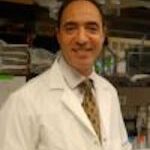
Tarek Abbas, PhD
Research in my laboratory is focused on understanding the role of the ubiquitin system in the development and progression of human cancer and its role in promoting cellular responses to current therapeutic agents, such as ionizing radiation, and the development of resistance to anti-cancer agents. We are particularly interested in investigating the regulated process of protein ubiquitination and proteolysis of DNA sensing and repair molecules. Currently, there are a handful of examples where DNA repair proteins are regulated at the level of ubiquitin-dependent proteolysis and current evidence suggest that many others are yet to be identified specifically in post-repair recovery. Thus, we hope this line of investigation will lead to the genetic and biochemical characterization of novel pathways that can be potentially exploited for therapeutic intervention.
يركز البحث في مختبري على فهم دور نظام يوبيكويتين في مرض السرطان وتطوره ودوره في تعزيز الاستجابات الخلوية للعوامل العلاجية الحالية ، مثل الإشعاع المؤين ، وتطوير مقاومة العوامل المضادة للسرطان. نحن مهتمون بشكل خاص بالتحقيق في العملية المنظمة لتواجد البروتين في كل مكان وتحلل البروتينات لاستشعار الحمض النووي وإصلاح الجزيئات. حاليًا ، هناك عدد قليل من الأمثلة حيث يتم تنظيم بروتينات إصلاح الحمض النووي على مستوى تحلل البروتين المعتمد على يوبيكويتين ، وتشير الأدلة الحالية إلى أن العديد من البروتينات الأخرى لم يتم تحديدها بعد على وجه التحديد في فترة التعافي بعد الإصلاح. وبالتالي ، نأمل أن يؤدي هذا الخط من البحوث إلى التوصيف الجيني والكيميائي الحيوي للمسارات الجديدة التي يمكن استغلالها للتدخل العلاجي
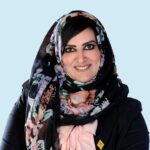
Ghada Amer, PhD
Professor Ghada Amer is the Vice Dean for Postgraduate Studies and Research in the College of Engineering at Benha University, Chair of the Center of Strategic Studies for Science and Technology, and the Vice President of the Arab Science and Technology Foundation. She holds a few more positions within her profession, like the Director of Innovation and Entrepreneurship Center at Benha University, CEO and the Co-founder of ASTF innovation Lab, ex-Head of Electrical Engineering Department at Benha University, and the CEO of the Global Awqaf Research Center. In 2016, she was selected to be one of the Rolexes Enterprise Awards for Innovation Jury members.
الأستاذ الدكتور غادة عامر هي وكيل كلية الهندسة للدراسات العليا والبحوث بجامعة بنها وزميل ومحاضر في كلية الدفاع الوطني – أكاديمية ناصر العسكرية العليا، ورئيس مركز الدراسات الاستراتيجية للعلوم والتكنولوجيا ونائب رئيس المؤسسة العربية للعلوم والتكنولوجيا. شغلت عددًا من المناصب الاخرى، مثل مدير مركز الابتكار وريادة الأعمال في اكاديمية البحث العلمي – مصر، ومدير مركز الابتكار وريادة الأعمال في جامعة بنها ، والرئيس التنفيذي والمؤسس المشارك لمختبر الابتكار ASTF ، والرئيس السابق لقسم الهندسة الكهربائية بجامعة بنها والمدير التنفيذي للأوقاف العالمية. كما اختيرت لتكون ضمن أحد أعضاء لجنة تحكيم جوائز” رولكس” للابتكار بسويسرا.
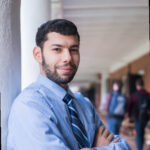
Mouadh Benamar, PhD
Mouadh is currently working as a research fellow in Dr. Rizwan Haq’s laboratory at Dana Farber Cancer Institute—a principal teaching affiliate of Harvard Medical School—studying innate immunity and resistance to cancer therapeutics. Mouadh’s work aims to develop new models to evaluate resistance to immunotherapy, such as checkpoint inhibitors, and characterize resistance pathways at the molecular level to develop novel therapeutic strategies to improve treatment in Melanoma patients. Mouadh graduated from high school in Algeria in 2007. Shortly after, Mouadh’s family moved to the United States where he first enrolled in Northern Virginia Community College before completing his Bachelor Degree in Science at the University of Virginia (UVA) in 2012. Mouadh joined Dr. Tarek Abbas’s lab as a laboratory specialist studying DNA replication and the role of the ubiquitin ligase degradation system in cancer progression, particularly in Melanoma. In 2014, Mouadh joined UVA’s Biomedical Sciences Graduate Program as a PhD candidate in the same laboratory. Under Dr. Abbas’s mentorship, Mouadh expanded on his previous work and earned his PhD in Biochemistry and Molecular Genetics in July 2020.
يعمل معاذ حاليًا كزميل باحث في مختبر الدكتور رضوان حق في معهد دانا فاربر للسرطان ، وهو فرع تعليمي رئيسي تابع لكلية الطب بجامعة هارفارد ، ويدرس المناعة الفطرية ومقاومة علاجات السرطان. يهدف عمل معاذ إلى تطوير نماذج جديدة لتقييم مقاومة العلاج المناعي وتوصيف مسارات المقاومة على المستوى الجزيئي لتطوير استراتيجيات علاجية جديدة لتحسين العلاج في مرضى سرطان الجلد. تخرج معاذ من المدرسة الثانوية بالجزائر عام 2007. بعد فترة وجيزة ، انتقلت عائلة معاذ إلى الولايات المتحدة حيث التحق أولاً بكلية فيرجينيا الشمالية قبل إكمال درجة البكالوريوس في العلوم من جامعة فيرجينيا (UVa) في عام 2012. انضم معاذ إلى مختبر د. طارق عباس كأخصائي مختبر يدرس تكرار الحمض النووي ودور نظام تحلل اليوبيكويتين ligase في تطور السرطان ، وخاصة في الورم الميلانيني. في عام 2014 ، انضم معاذ إلى برنامج الدراسات العليا في العلوم الطبية الحيوية التابع لـ UVa كطالب في نفس المختبر. تحت إشراف الدكتور عباس ، توسع معاذ في عمله السابق وحصل على درجة الدكتوراه في الكيمياء الحيوية وعلم الوراثة الجزيئية في يوليو 2020
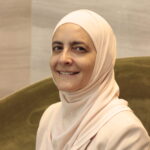
Rana Dajani, PhD
PhD molecular cell biology from University of Iowa, currently Cmalakova Fellow at the Jepson School of Leadership at the University of Richmond, Harvard Radcliff fellow, a Fulbrighter, Fulbright Foreign Student Program, Jordan to the United States, 2000; Fulbright Visiting Scholar Program, Jordan to the United States, 2012. Eisenhower fellow, Professor, former Center of Studies Director, Hashemite University, Jordan, Yale and Cambridge visiting Professor. World expert on genetics of Circassian and Chechan populations in Jordan. Established stem cell research ethics law in Jordan. Advocate for biological evolution and Islam, speaker at McGill University and MIT. Jordan team leader in studying refugee youth with Yale University and the epigenetics of trauma across generations. Higher education reform expert, member UN Women Jordan Advisory Council. Writer in Science and Nature, Established a women mentor network, received Partnerships for Enhanced Engagement in Research (PEER) Award 2014. Organized the first gender summit for the Arab world 2017. Most influential women scientists in Islamic World, 12 among 100 Most Influential Arab Women 2015, Women in Science Hall of Fame 2015, King Hussein Cancer Institute for Cancer and Biotechnology Award 2009 and 2016. Global Changemaker Award for celebrating 70 years of the Fulbright Program. President of the Society for the Advancement of Science, Technology, and Innovation in the Arab World.
Awarded the Jordan star of science by His Majesty King Abdullah II, University of Iowa, College of Medicine, Distinguished Alumni Award 2018, Higher Education Reform Expert EU-TEMPUS, Jordan, Founder Service Learning Center, Hashemite University, speaker at TEDxDeadsea and TEDxPSUT, World Islamic Economic Forum 2012 and World Science Forum 2015 and 2017.
Developed a community-based model, “We love reading,” to encourage children to read for pleasure. Received Synergos Arab world social innovators 2009, Clinton Global Initiative 2010, Library of Congress best practices 2013, World Innovation Summit in Education Award 2014, King Hussein Medal of Honor 2014, Star Award 2015, IDEO.org Best Refugee Education Program 2015, UNESCO International Literacy Prize 2017, World Literacy Council Award 2018, the Jacobs Social Entrepreneurship Award 2018, Science, Technology and Innovation Award UN 2019, Ashoka Fellowship 2019, and UNHCR Nansen Refugee Award 2020.
Author of the book Five scarves, Doing the impossible: If we can reverse cell fate why can’t we redefine success, Nova Publisher 2018. Reviewed by Nature.
حصلت الدكتورة رنا الدجاني على دكتوراه في علم بيولوجيا الخلية الجزئية من جامعة ايوا في الولايات المتحدة الاميركية. حالياً هي زميلة كامالاكوفا في مدرسة جيبسون للقيادة بجامعة ريتشموند و أستاذة علم الأحياء والتكنولوجيا الحيوية في الجامعة الهاشمية في الأردن. مسبقًا، كانت الدكتورة زميلة في معهد رادكليف للدراسات المتقدمة بجامعة هارفارد. كما انها كانت أيضًا زميلة أيزنهاور، وأستاذة زائرة في برنامج فولبرايت بجامعة ييل، وأستاذة زائرة في جامعة كامبريدج. نركز ابحاثها على علم الوراثة للسكان الشركس والشيشان في الأردن و تجري دراسات الارتباط على مستوى الجينوم فيما يتعلق بمرض السكري والسرطان على الخلايا الجذعية. قادت الدكتورة دجاني تطوير قانون أخلاقيات أبحاث الخلايا الجذعية في الأردن. كما انها تدرس علم الوراثة المتوالي للصدمات عبر الأجيال. خبيرة إصلاح التعليم العالي و عضو هيئة الأمم المتحدة للمرأة في الأردن. كاتبة في العلوم والطبيعة ، وتدعو إلى نظرية التطور البيولوجي فيما يتعلق بالإسلام. أسست شبكة مرشدات نسائية ، وحصلت على جائزة شراكات من أجل تعزيز المشاركة في البحث (PEER) لعام 2014 .نظمت أول قمة جنسانية في العالم العربي عام 2017. طورت نموذجًا مجتمعيًا بعنوان “نحب القراءة” لتشجيع الأطفال على القراءة من أجل المتعة و حاز على العديد من الجوائز. كما أنها الفت كتاب خمسة أوشحة ، فعل المستحيل: إذا استطعنا عكس مصير الخلية فلماذا لا يمكننا إعادة تعريف النجاح. حازت الدكتورة دجاني على عدة جوائز منها: أكثر العالمات تأثيراً في العالم الإسلامي ، 12 من بين 100 أكثر العرب تأثيراً النساء 2015 ، قاعة مشاهير النساء في العلوم 2015 ، جائزة معهد الحسين للسرطان للسرطان والتكنولوجيا الحيوية 2009 و 2016. جائزة صانع التغيير العالمي للاحتفال بمرور 70 عامًا على برنامج فولبرايت. نجمة العلوم الأردنية من قبل جلالة الملك عبد الله الثاني،المتحدث في TEDxDeadsea و TEDxPSUT ،المنتدى الاقتصادي الإسلامي العالمي 2012 ومنتدى العلوم العالمي 2015 و 2017.
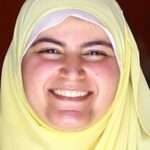
Eman Rabie
Eman got her BS from the Faculty of Pharmaceutical Sciences at Ain Shams University, Cairo, Egypt. She defended her MS thesis in 2016 at the Biotechnology program of the American University in Cairo (AUC). Currently, she is a PhD candidate at the same AUC program and works as a research assistant at the Medical Molecular Genetics department, National Research Centre, Egypt. Her work focuses on diagnosis and potential treatment of rare genetic disorders. Driven by the multidisciplinary nature encountered during her undergraduate and graduate studies, she aims to integrate recent computational and biotechnological tools into the field of rare diseases. Eman is a member of AUC biotechnology club and the Egyptian Society of Human Genetics where she usually helps organize workshops and short courses to disseminate science and increase awareness of rare diseases in Egypt.
حصلت إيمان على درجة البكالوريوس في العلوم الصيدلية من جامعة عين شمس بالقاهرة ، مصر. وقدمت رسالة الماجستير في 2016 في برنامج التكنولوجيا الحيوية بالجامعة الأمريكية بالقاهرة. وهي حاليًا طالبة دكتوراه في نفس البرنامج بالجامعة الأمريكية بالقاهرة وتعمل في نفس الوقت كمساعد باحث في قسم الوراثة الجزيئية الطبية بالمركز القومي للبحوث بمصر. يركز عملها البحثي على التشخيص والعلاجات المحتملة للأمراض الوراثية النادرة. وانطلاقا من الطبيعة متعددة التخصصات لدراستها الجامعية والدراسات العليا، تهدف إيمان إلى دمج الأدوات الحسابية والتكنولوجيا الحيوية الحديثة في مجال الأمراض النادرة. وهي عضو في نادي التكنولوجيا الحيوية بالجامعة الأمريكية والجمعية المصرية للوراثة البشرية حيث تساعد عادة في تنظيم ورش عمل ودورات قصيرة لنشر العلم والتوعية بالأمراض النادرة في مصر.
Organizers:
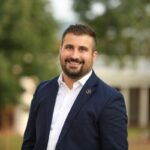
Arby Abood
PhD candidate at the University of Virginia School of Medicine. Interested in elucidating the genetics of osteoporosis.
طالب دكتوراه في كلية الطب – جامعة فرجينيا. مهتم بتوضيح دور الجينات لمرض هشاشة العظام.
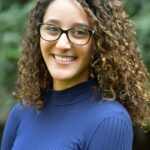
Marah Wahbeh
Marah is a 4th year PhD candidate in Human Genetics at Johns Hopkins. She works in the lab of Dimitri Avramopoulos where she studies schizophrenia genetic risk variants in stem cells.
طالبة دكتوراة في السنة الرابعة في علم الوراثة البشرية بجامعة جونز هوبكنز. تعمل مرح في مختبر الدكتور ديميتري أفراموبولوس حيث تدرس العوامل الجينية المؤثرة في مرض الشيزوفرينيا (الفصام).

